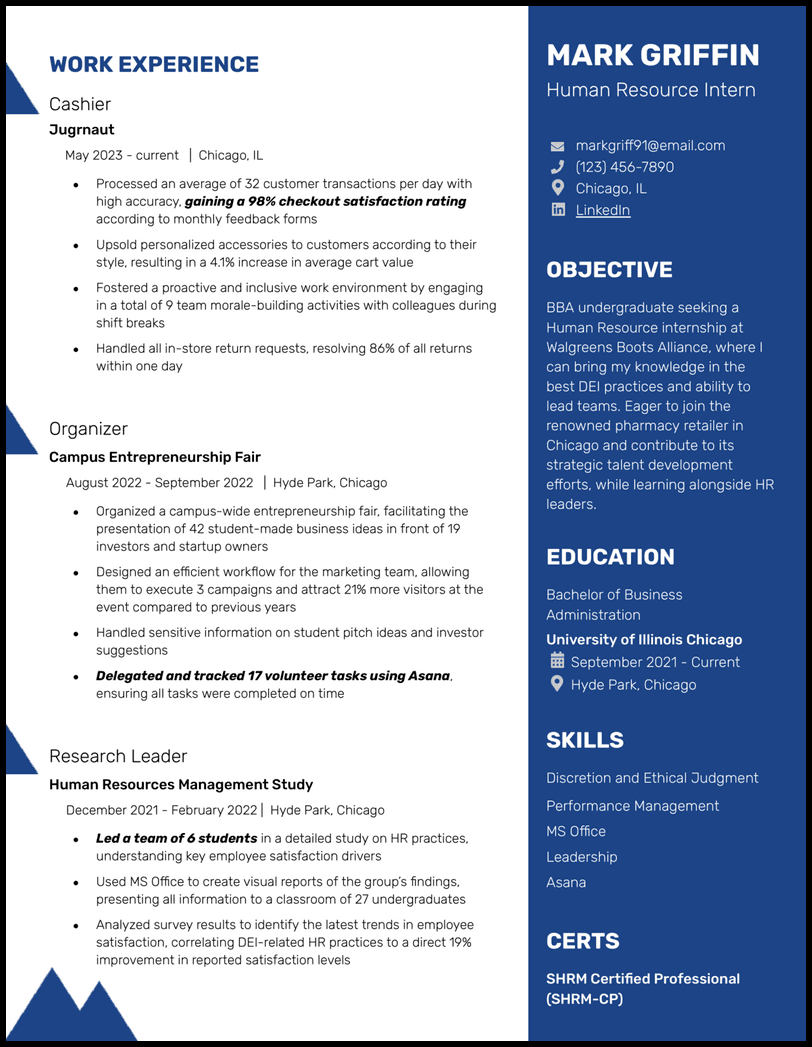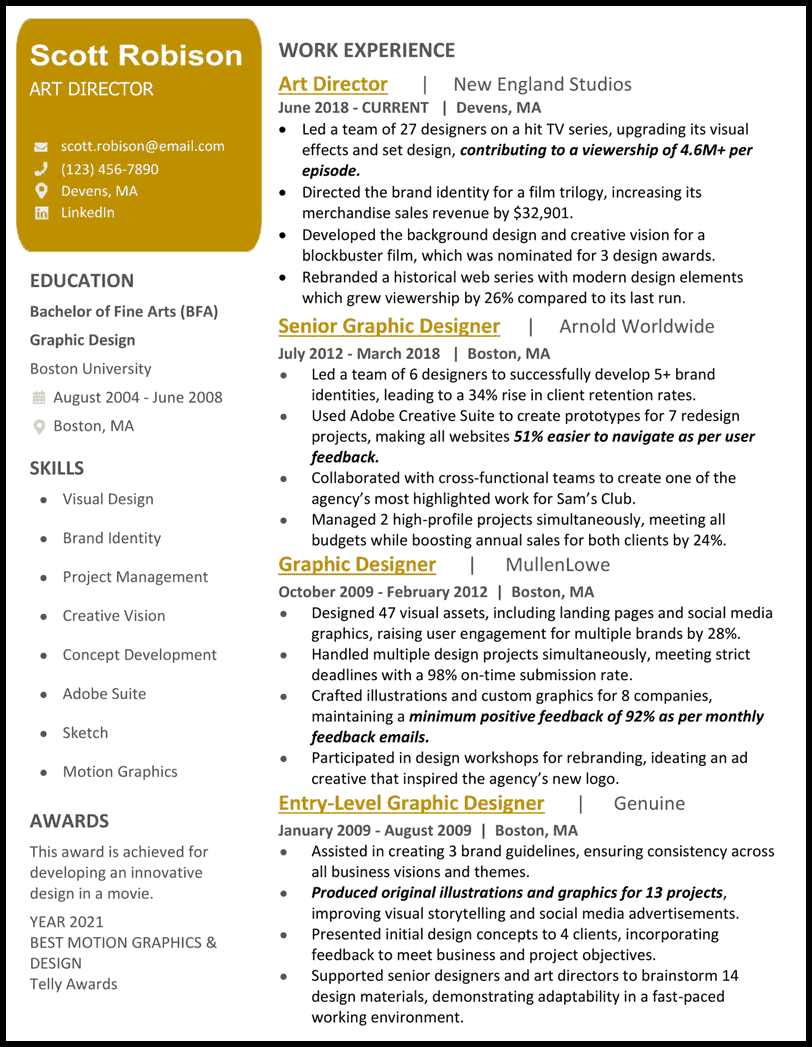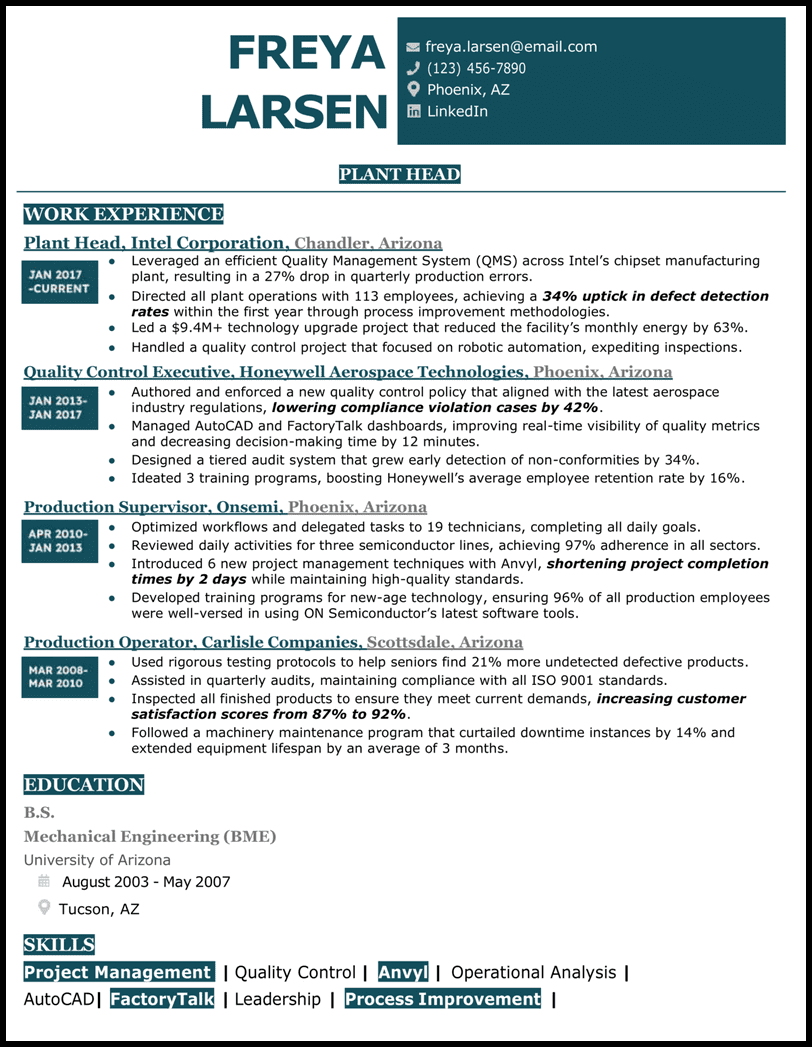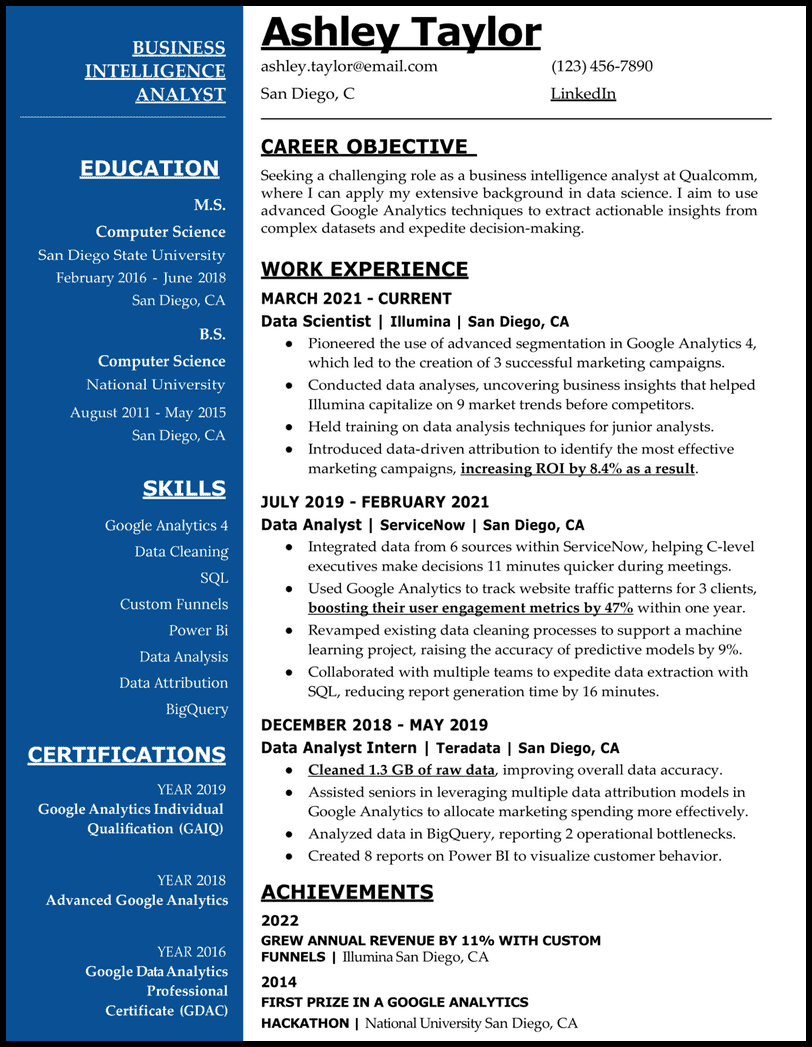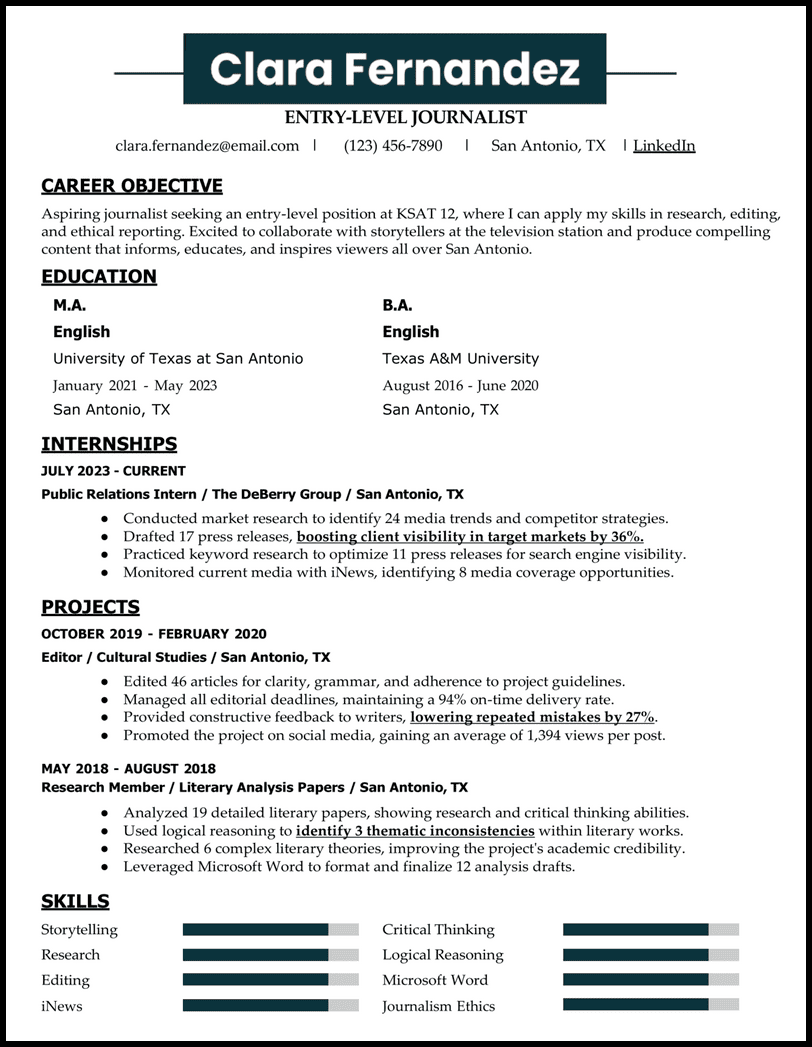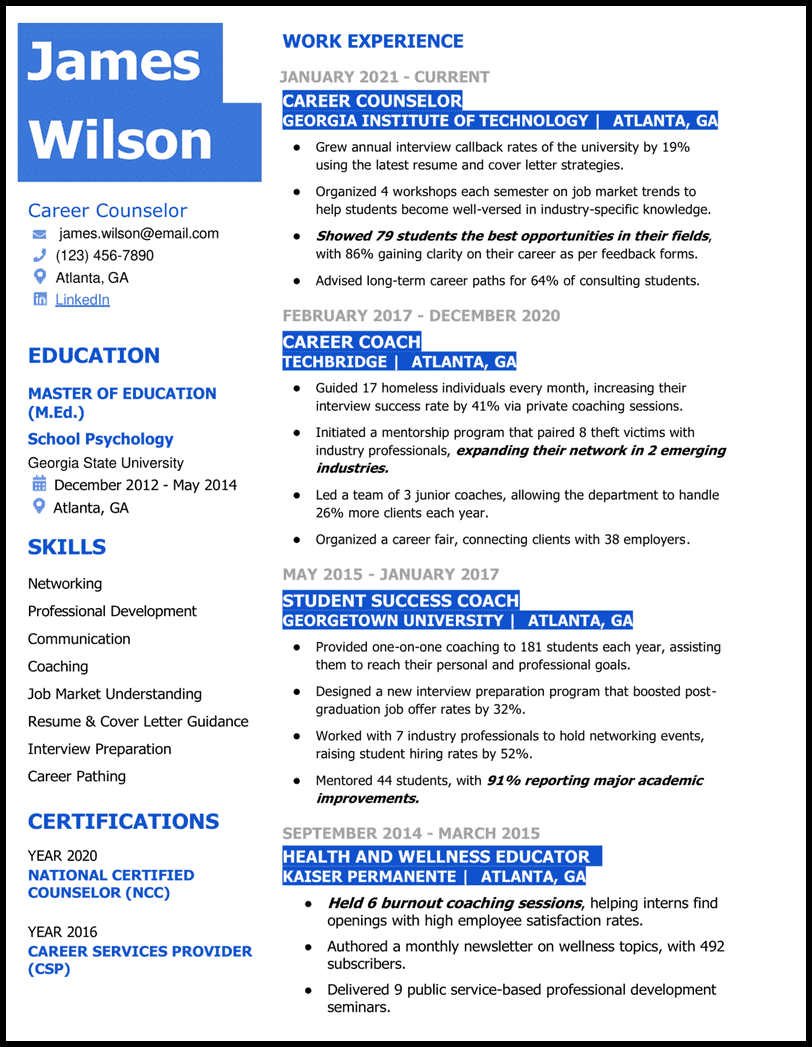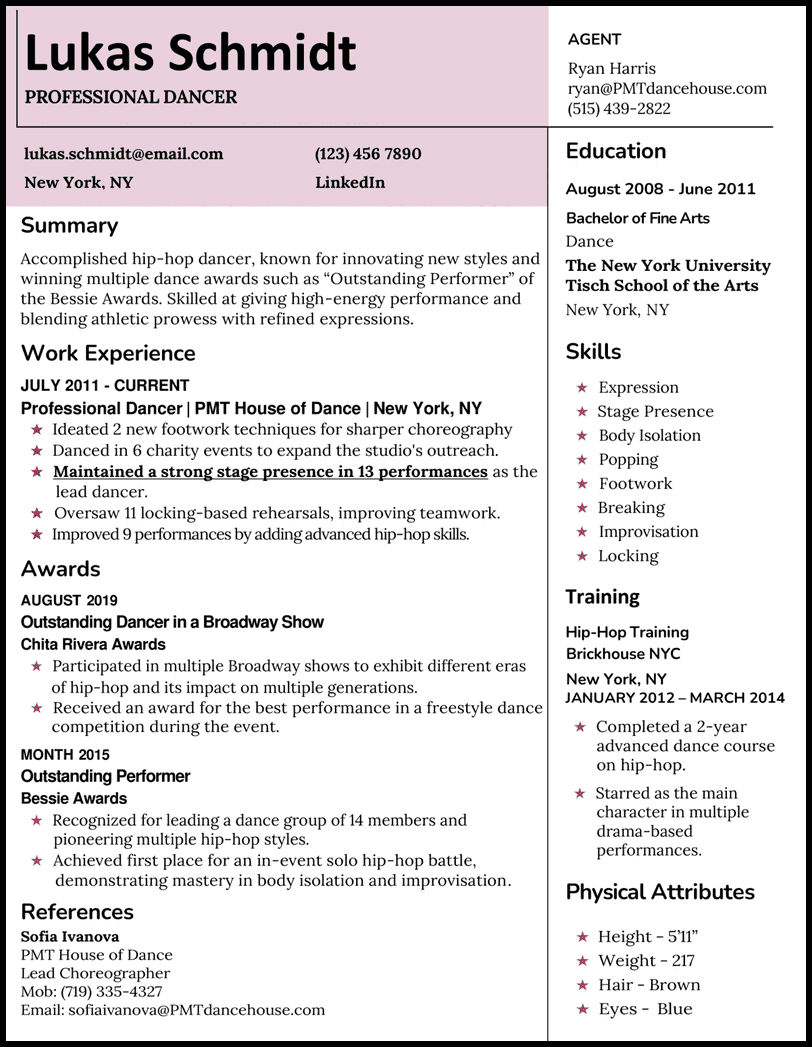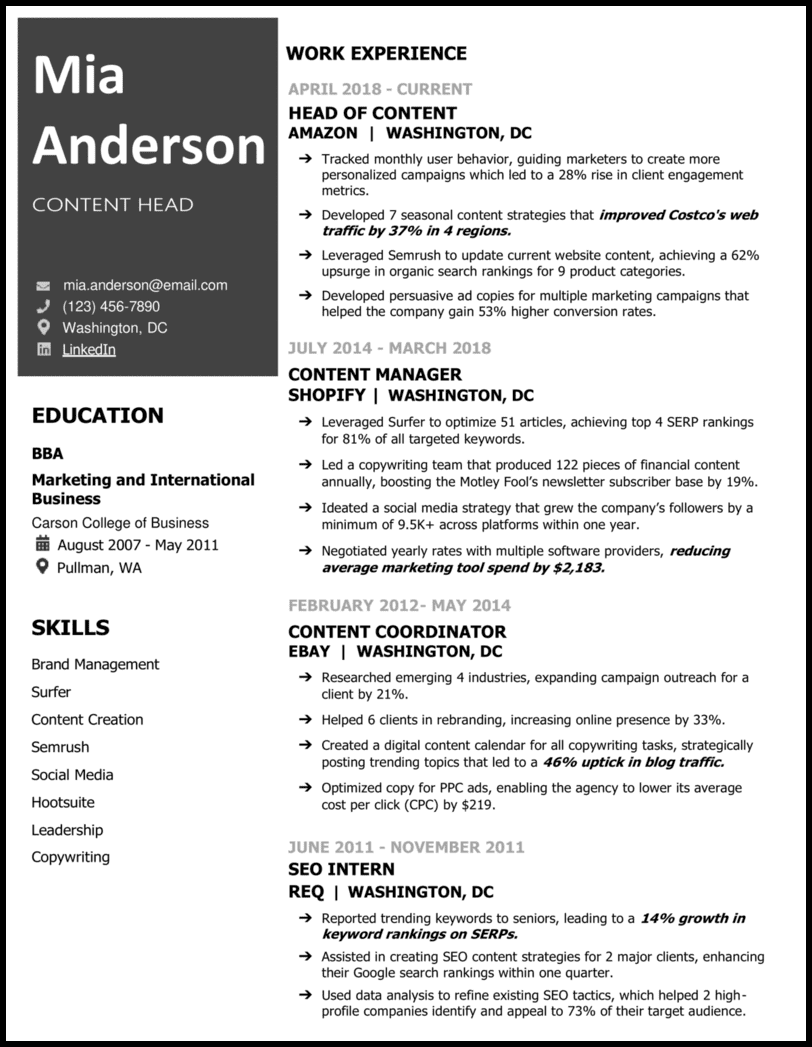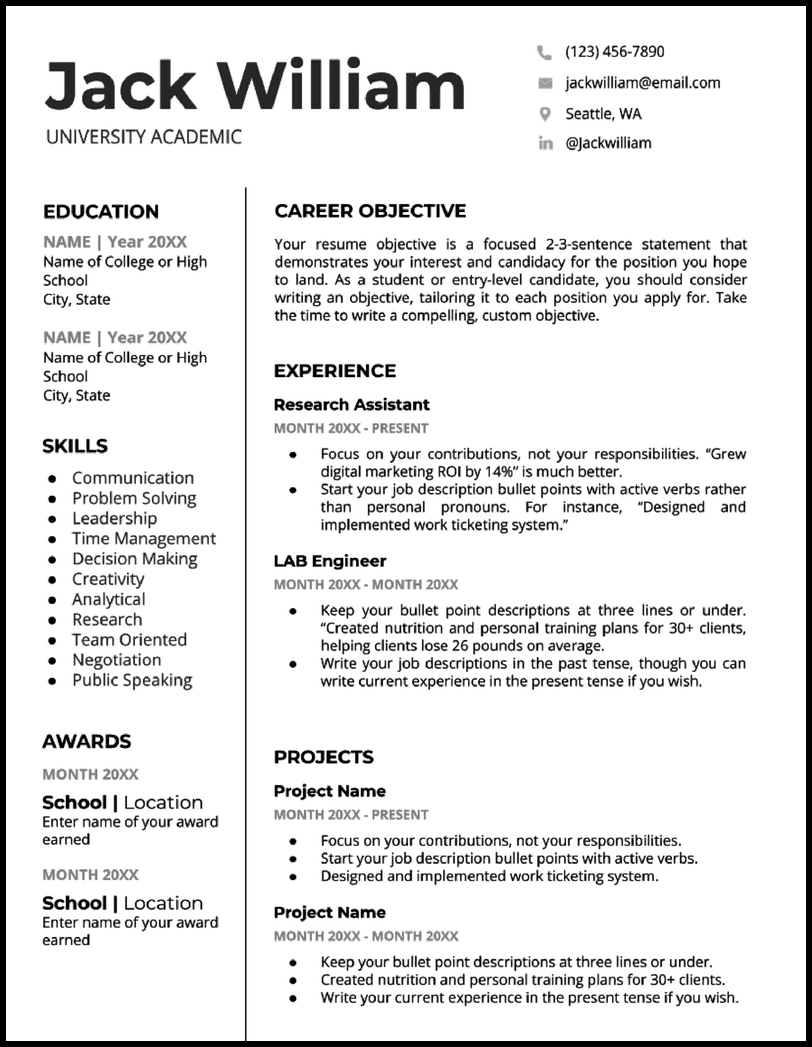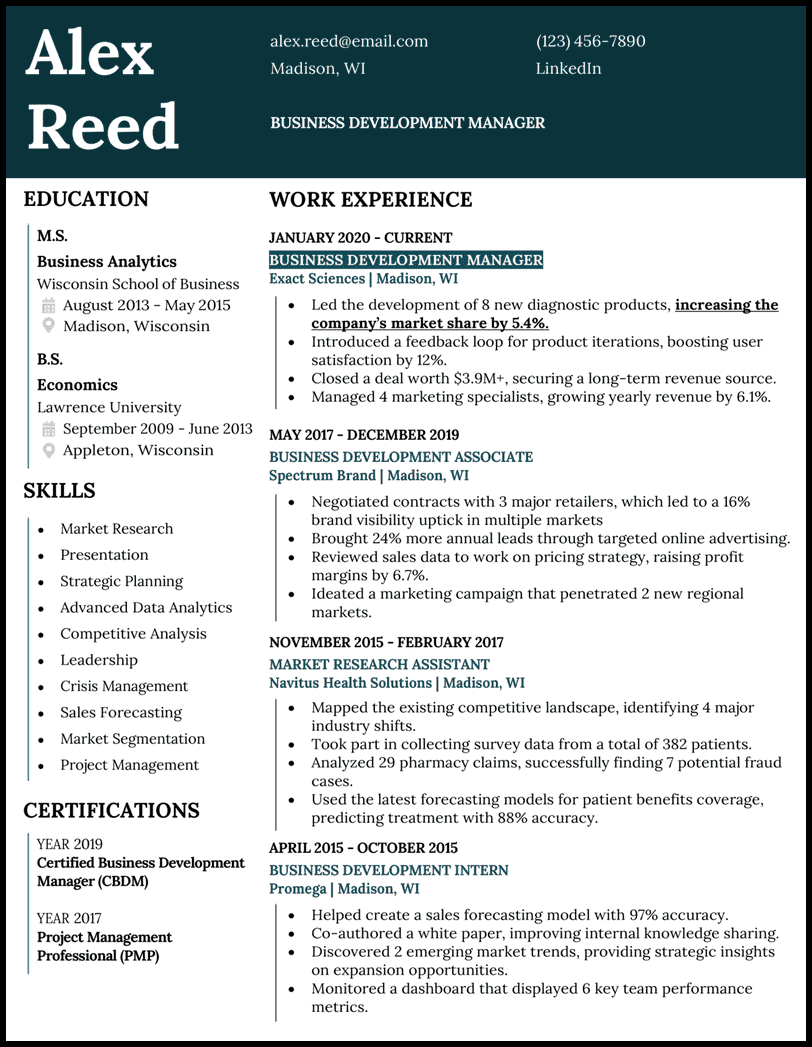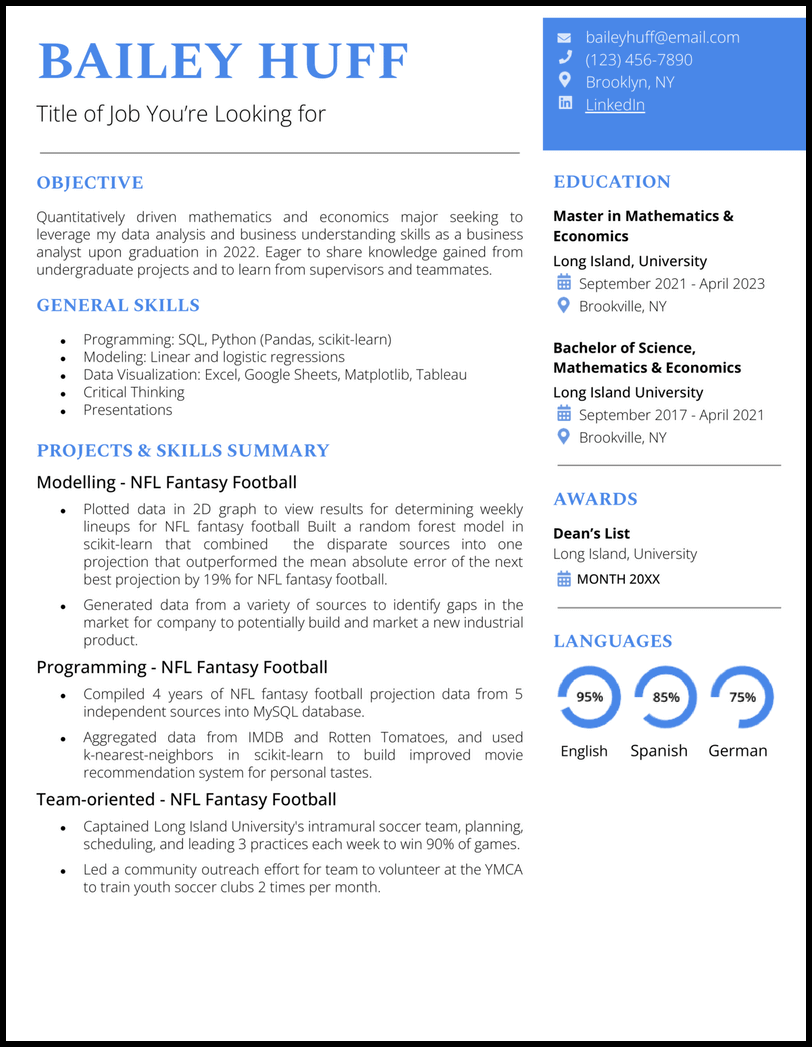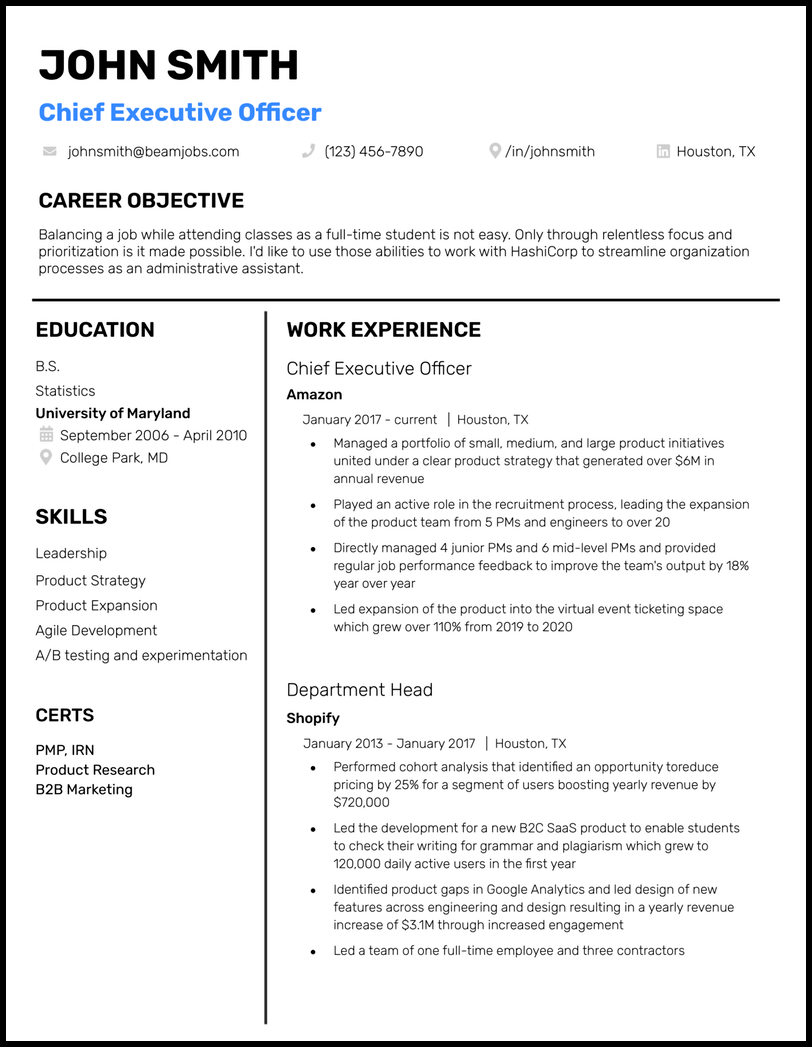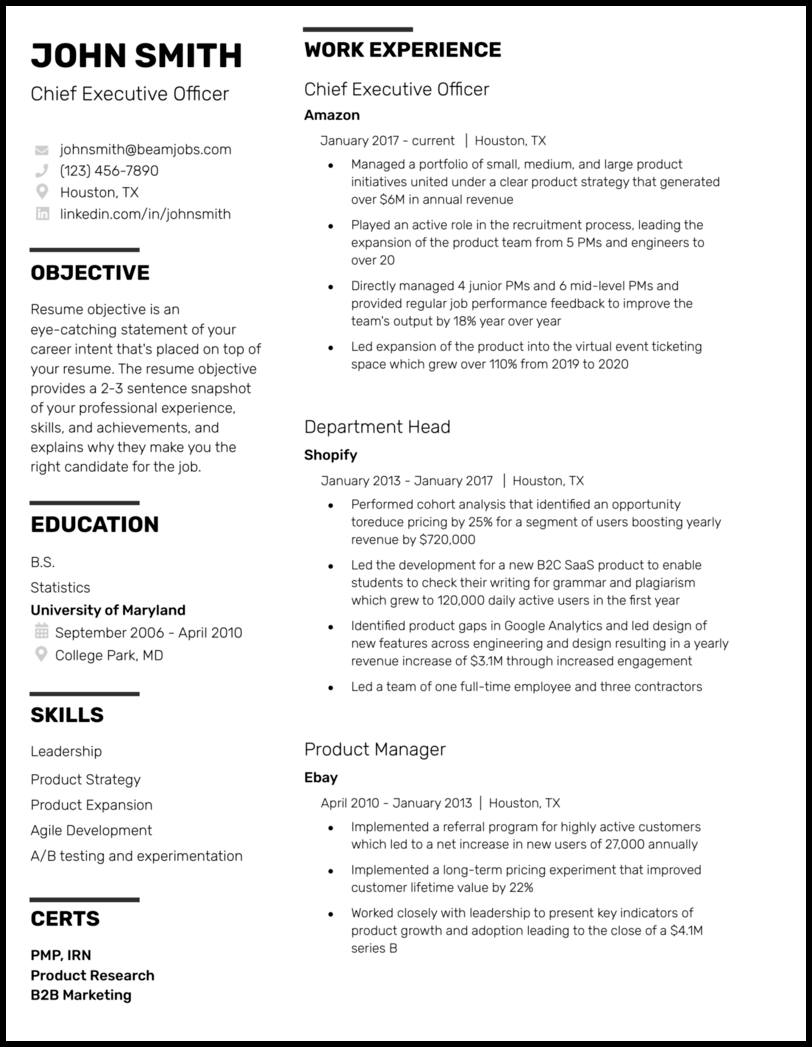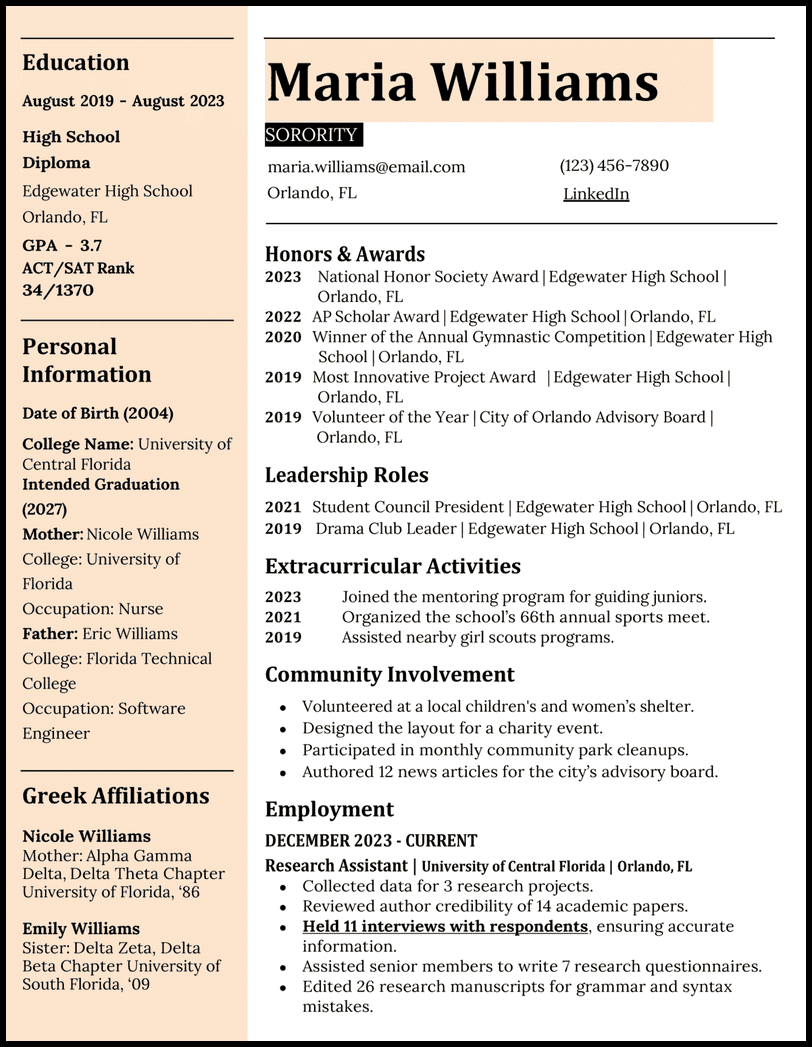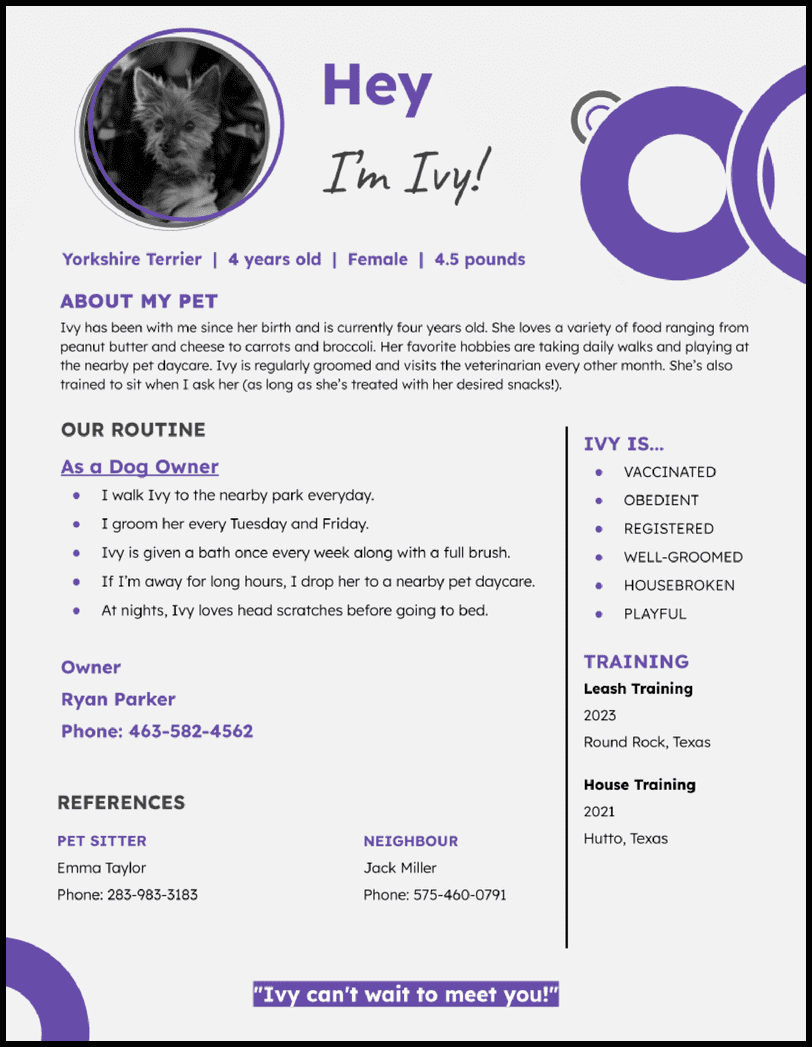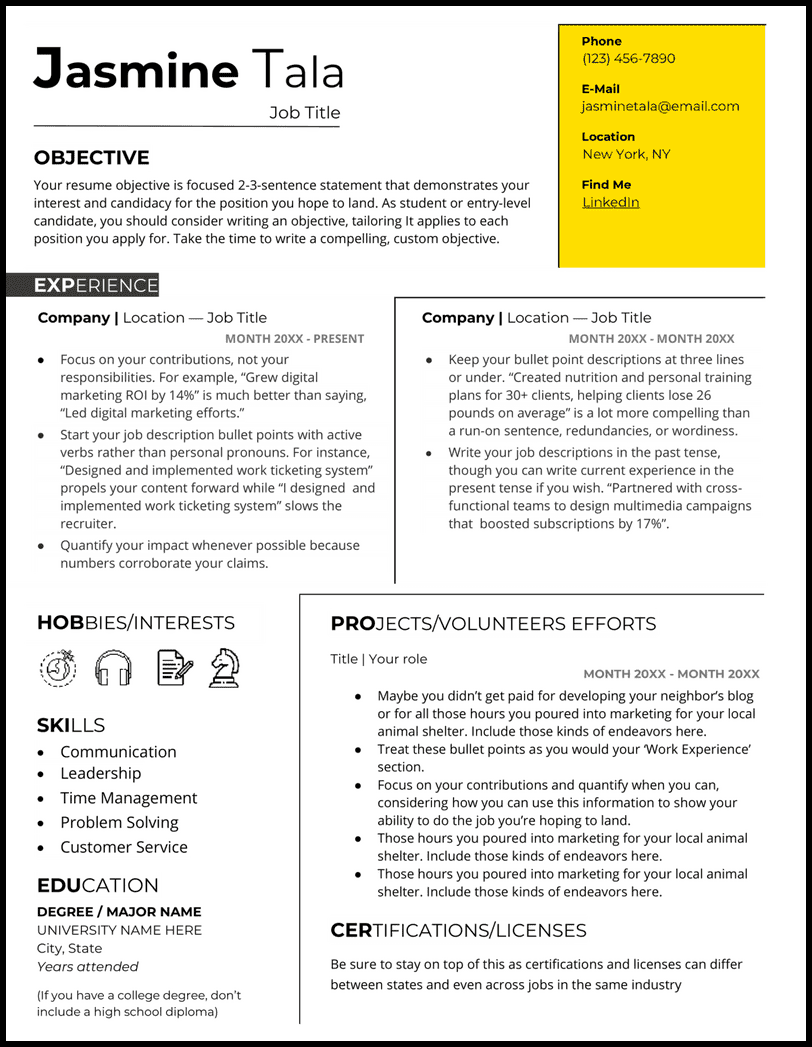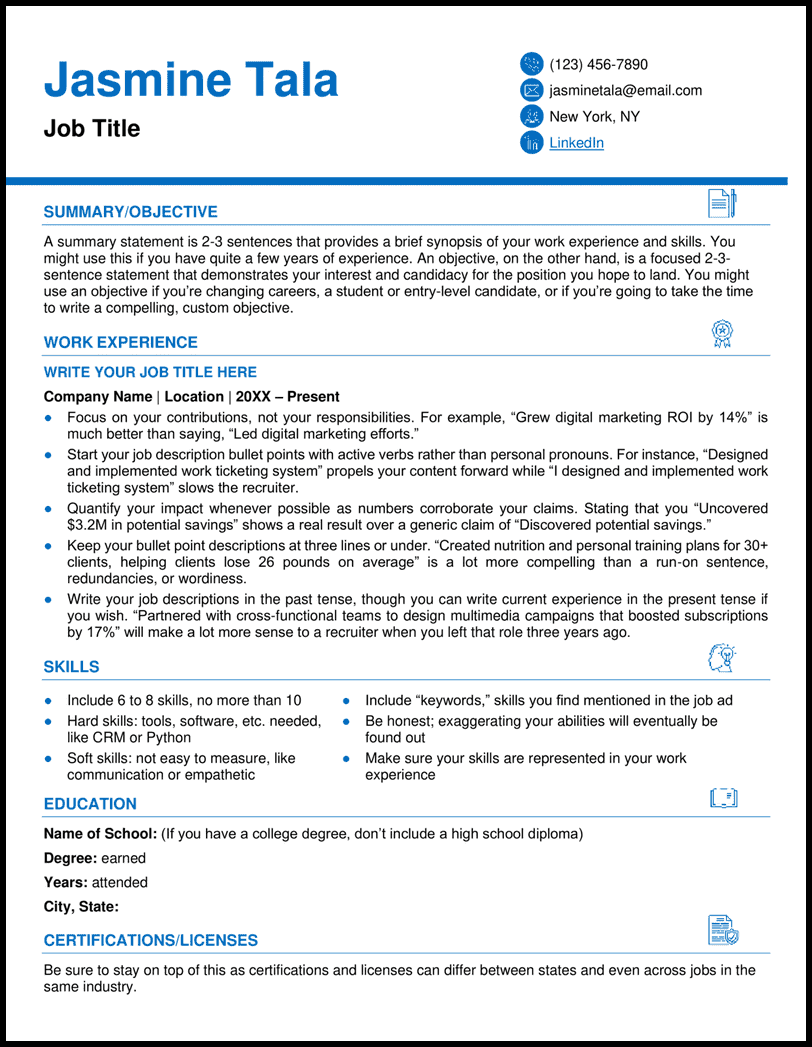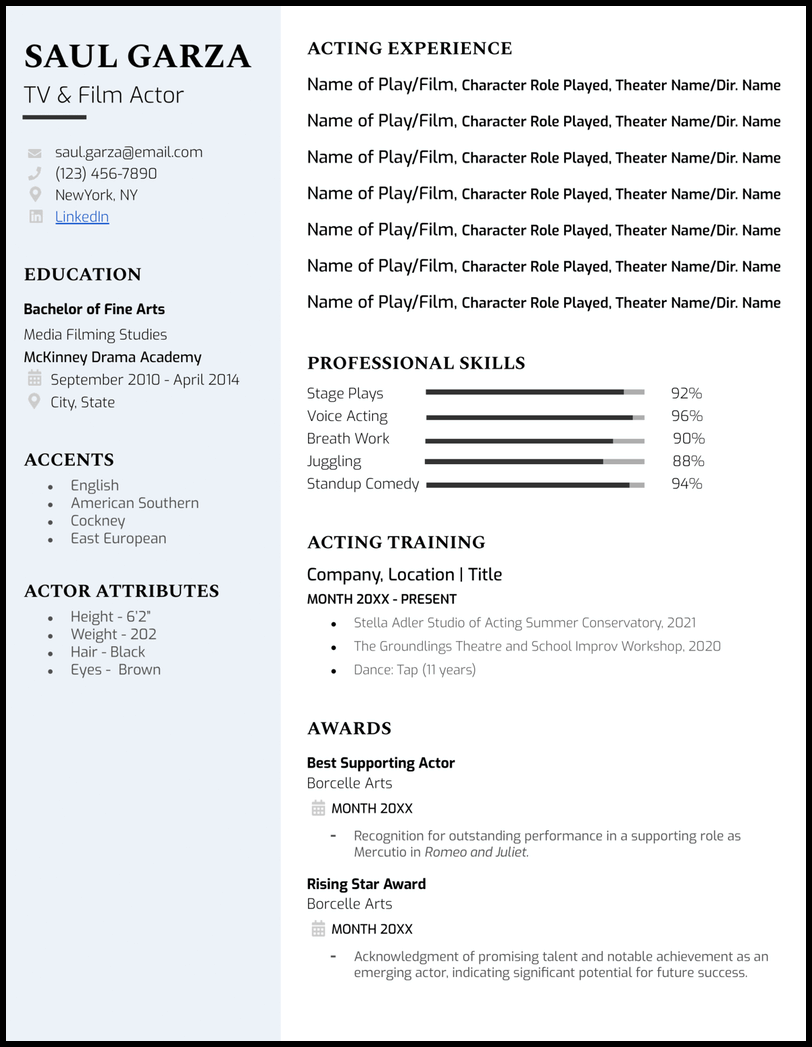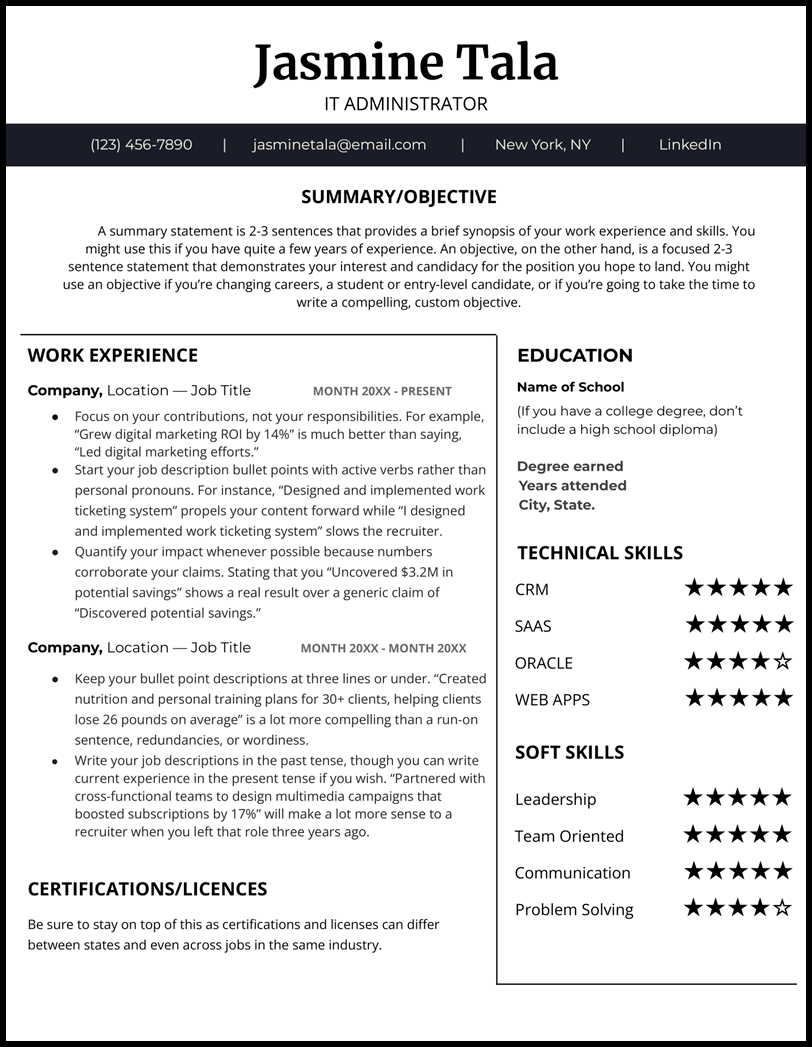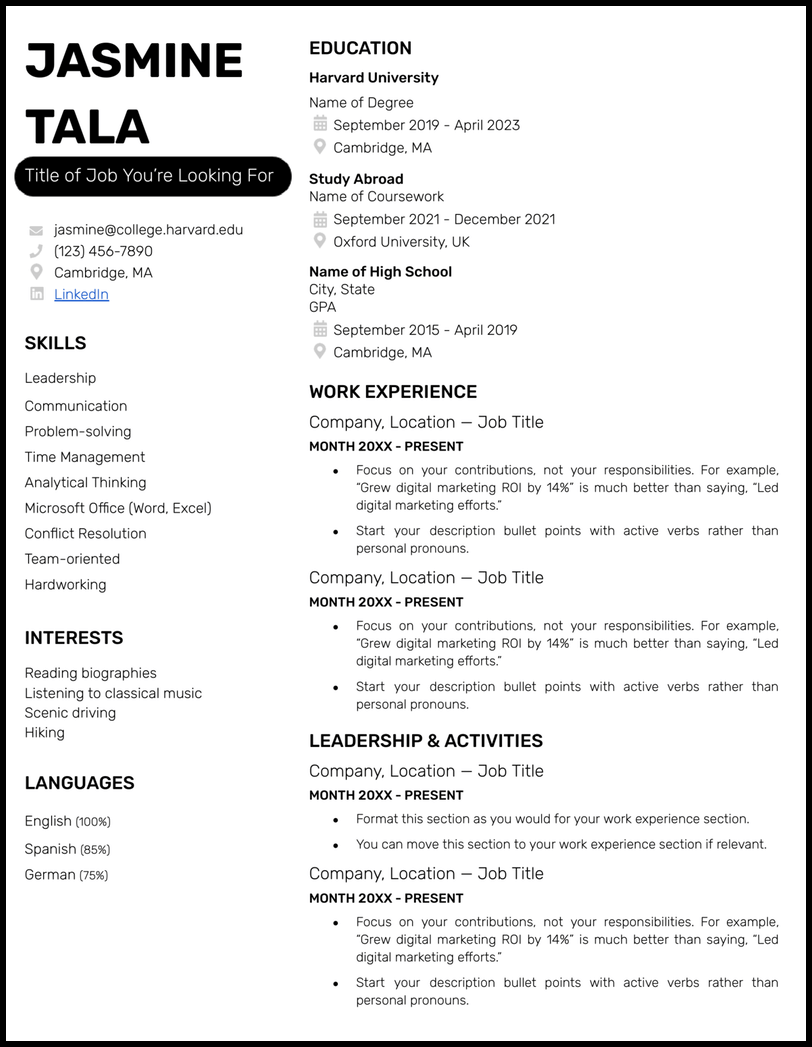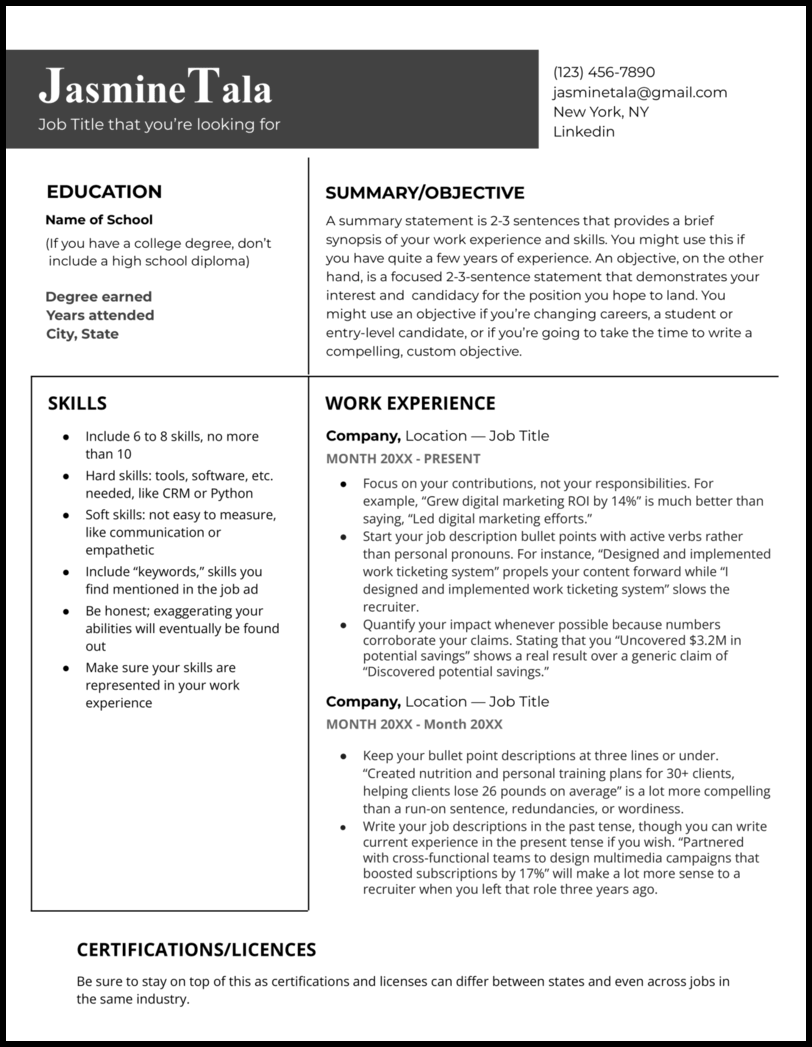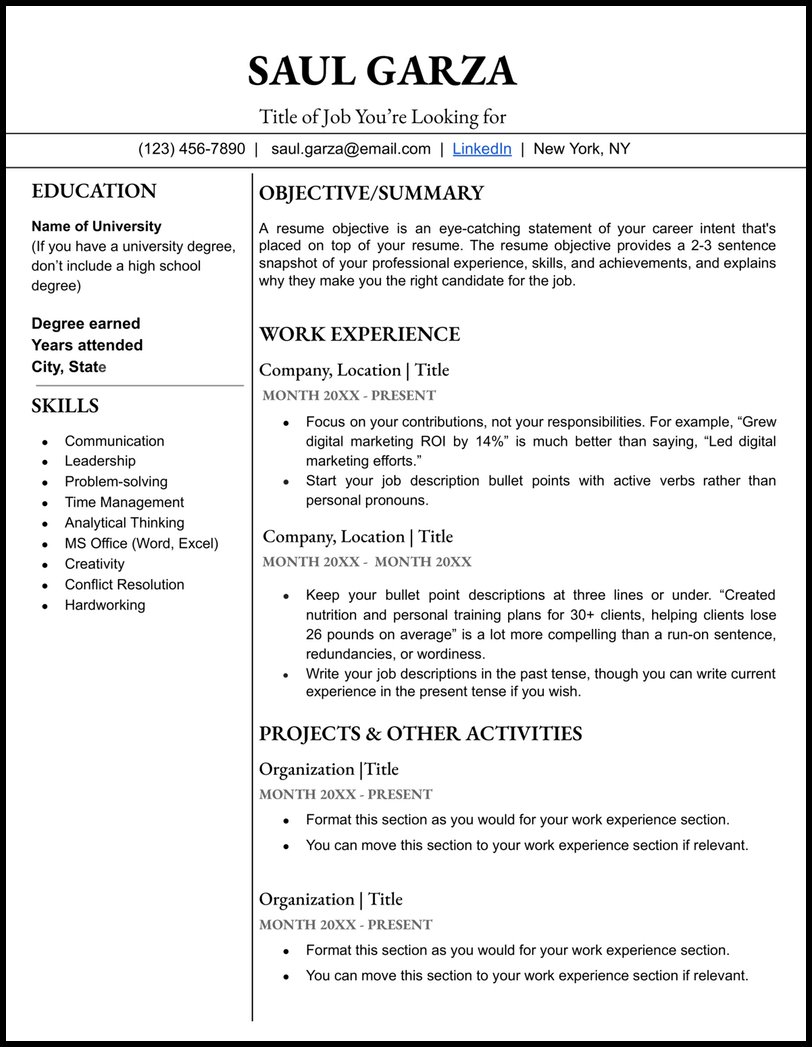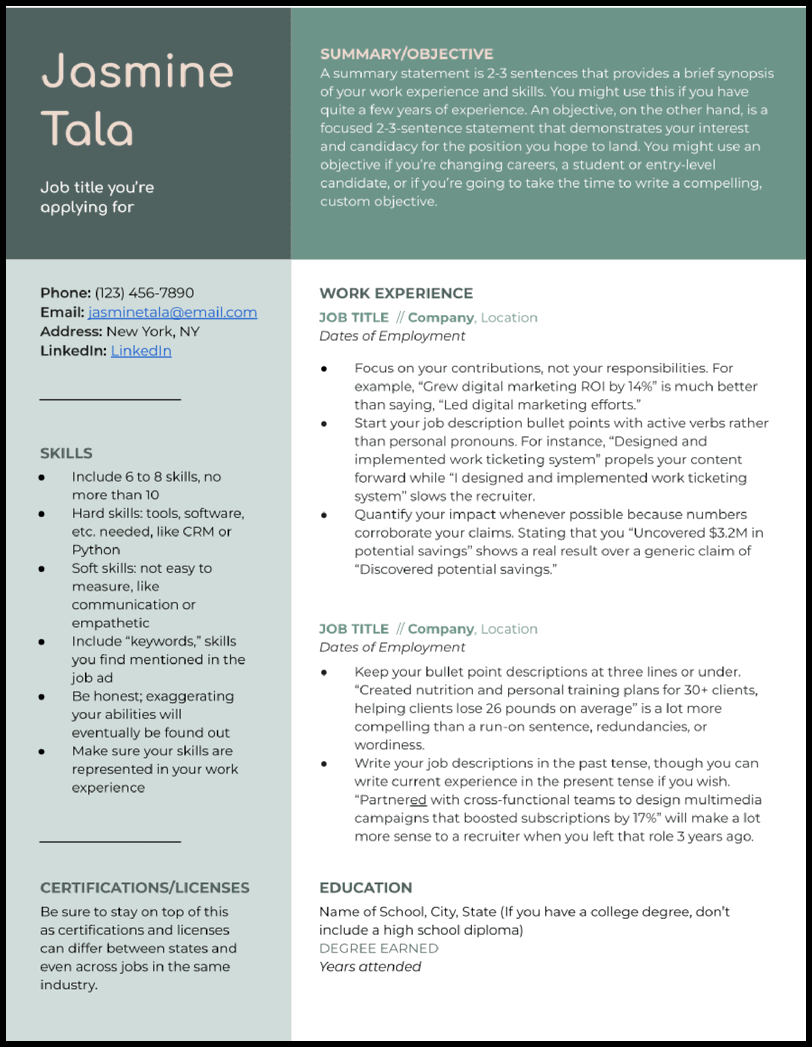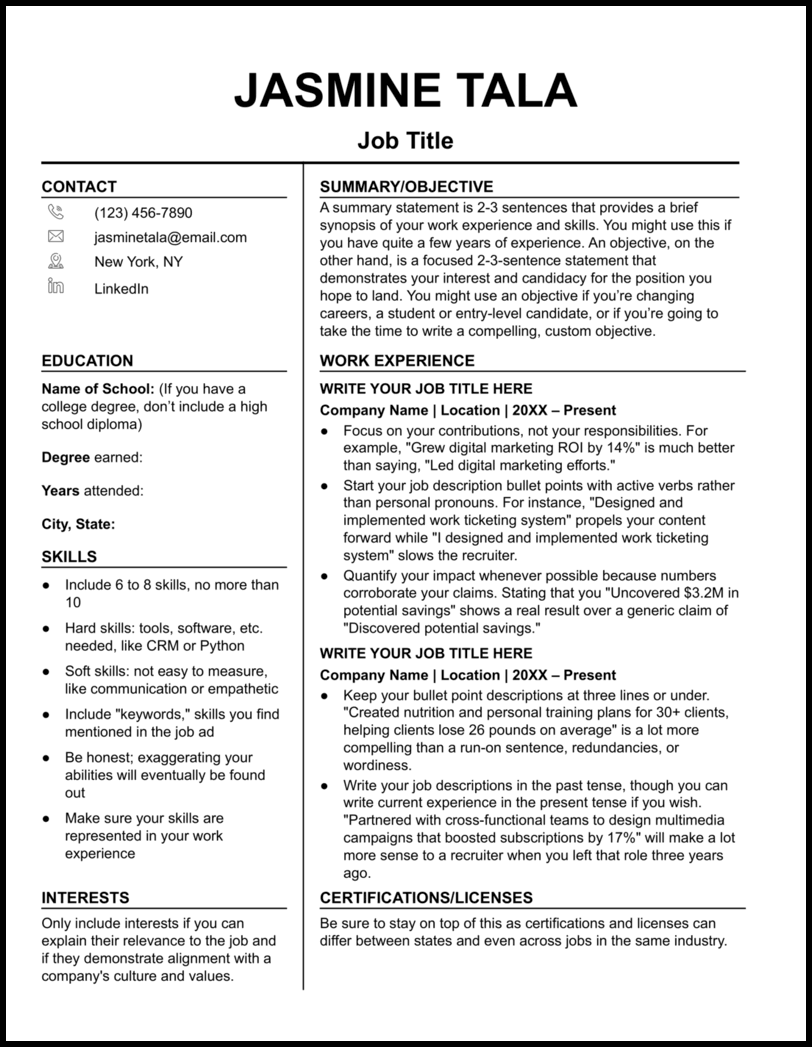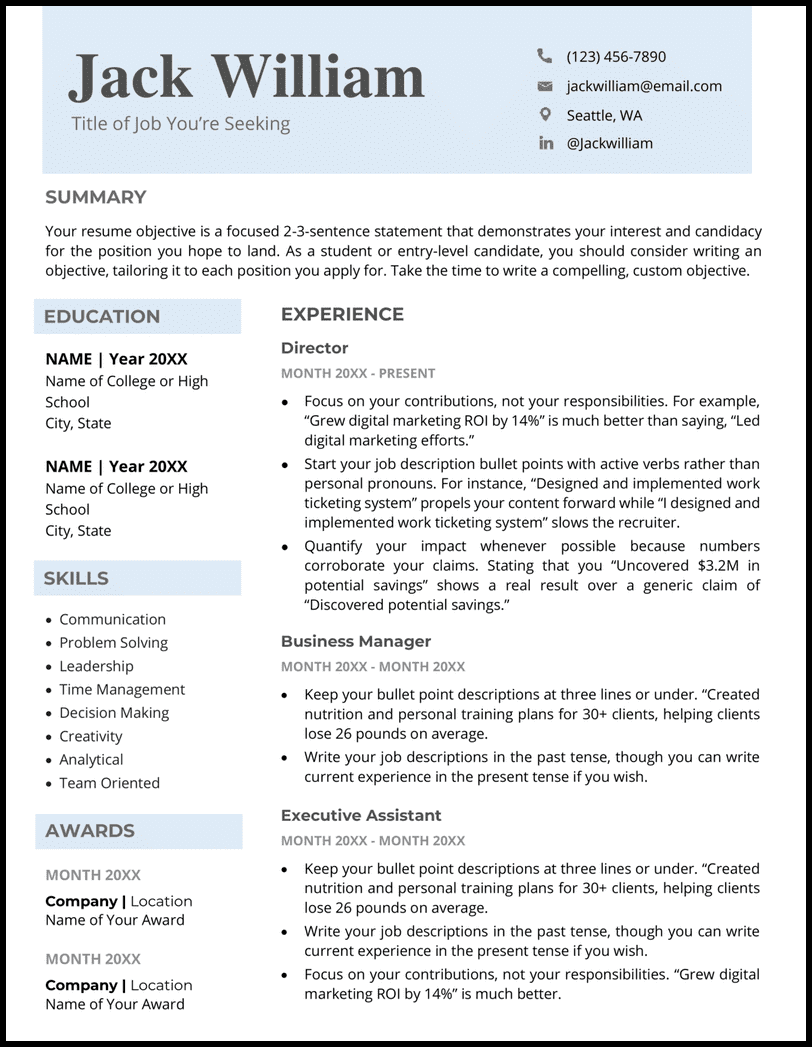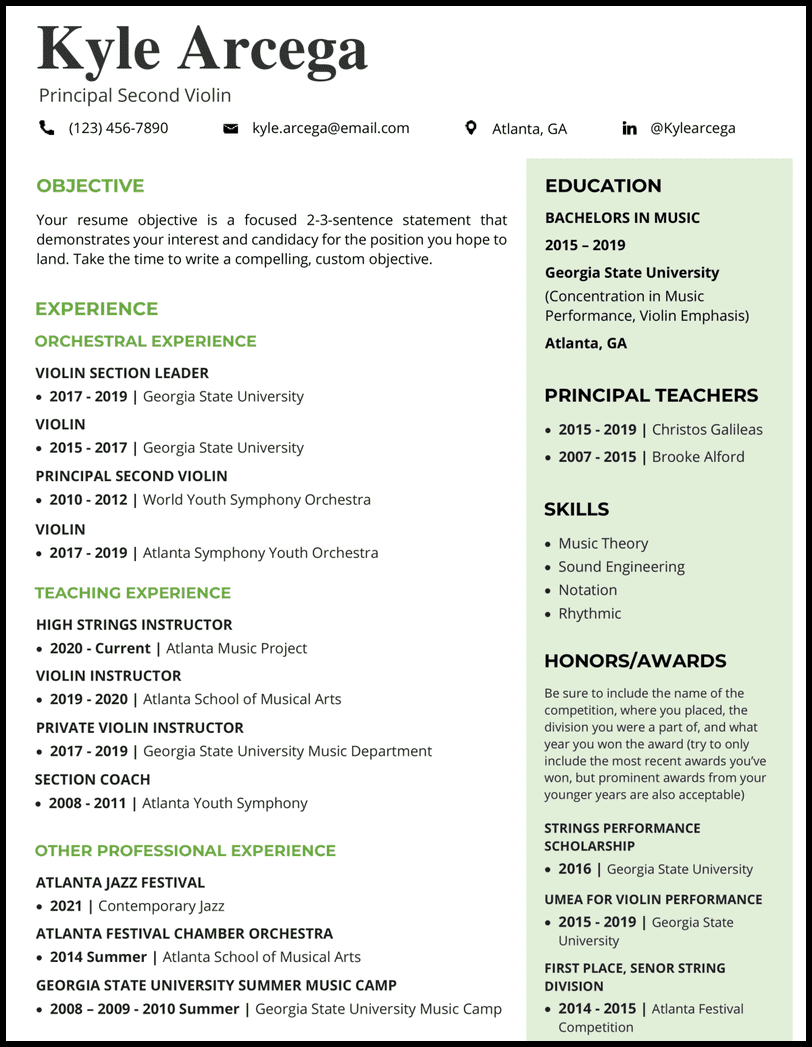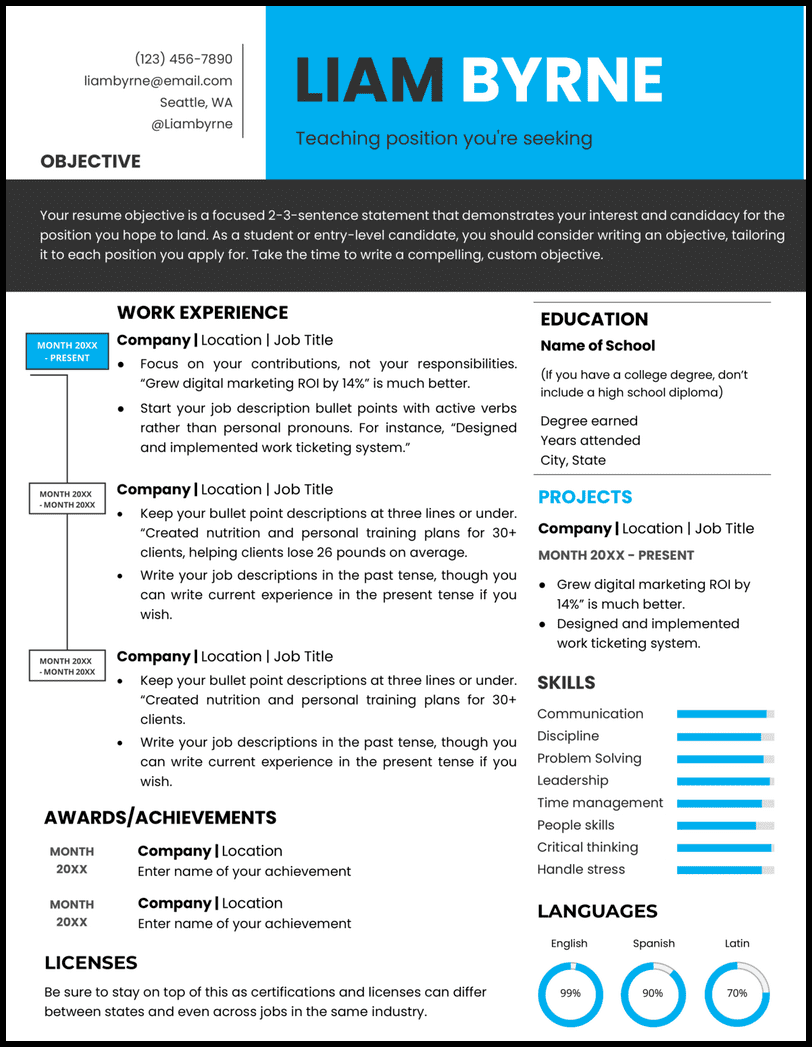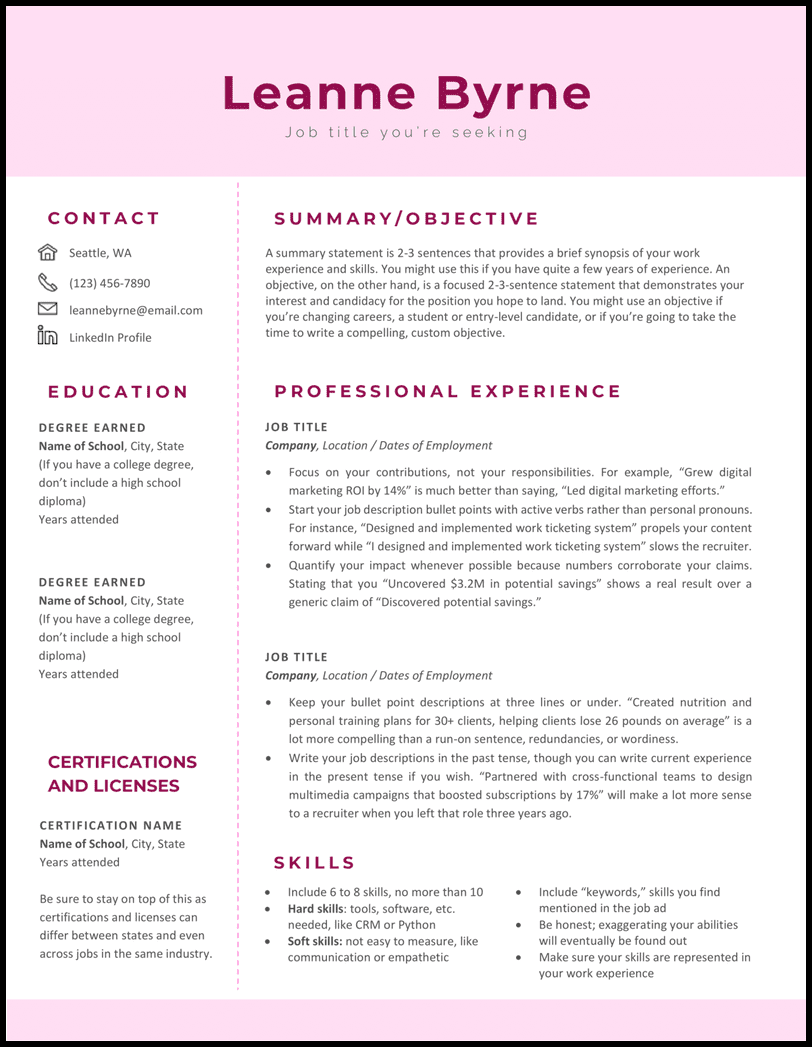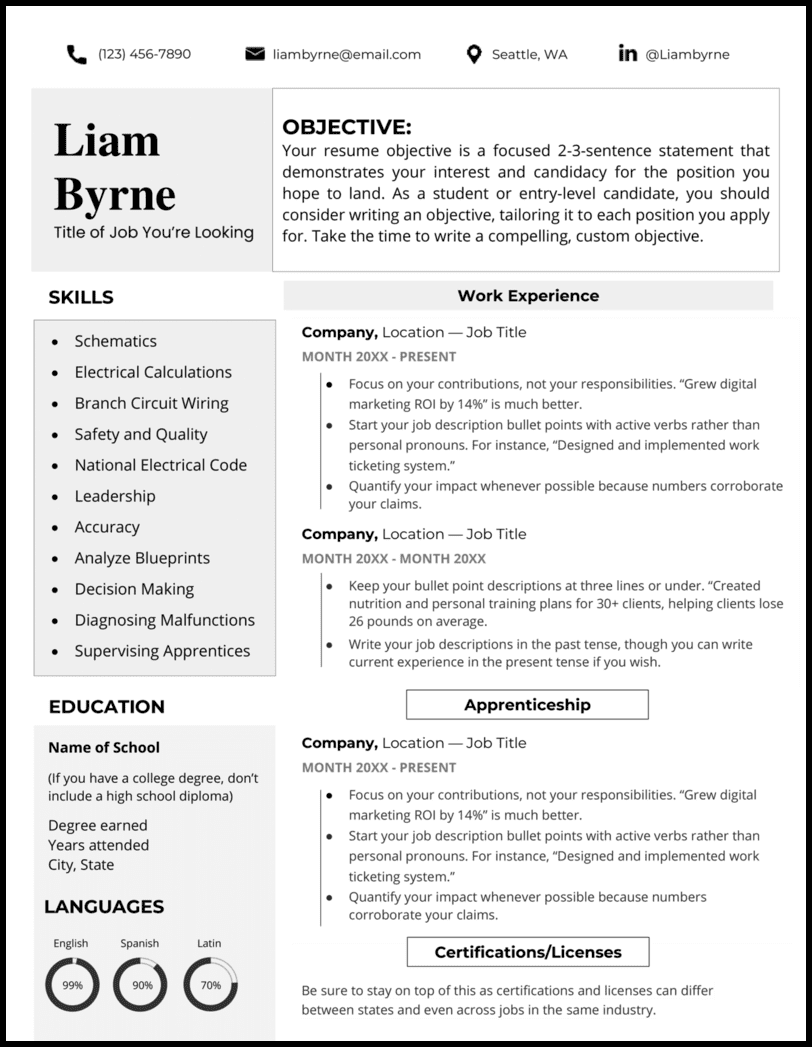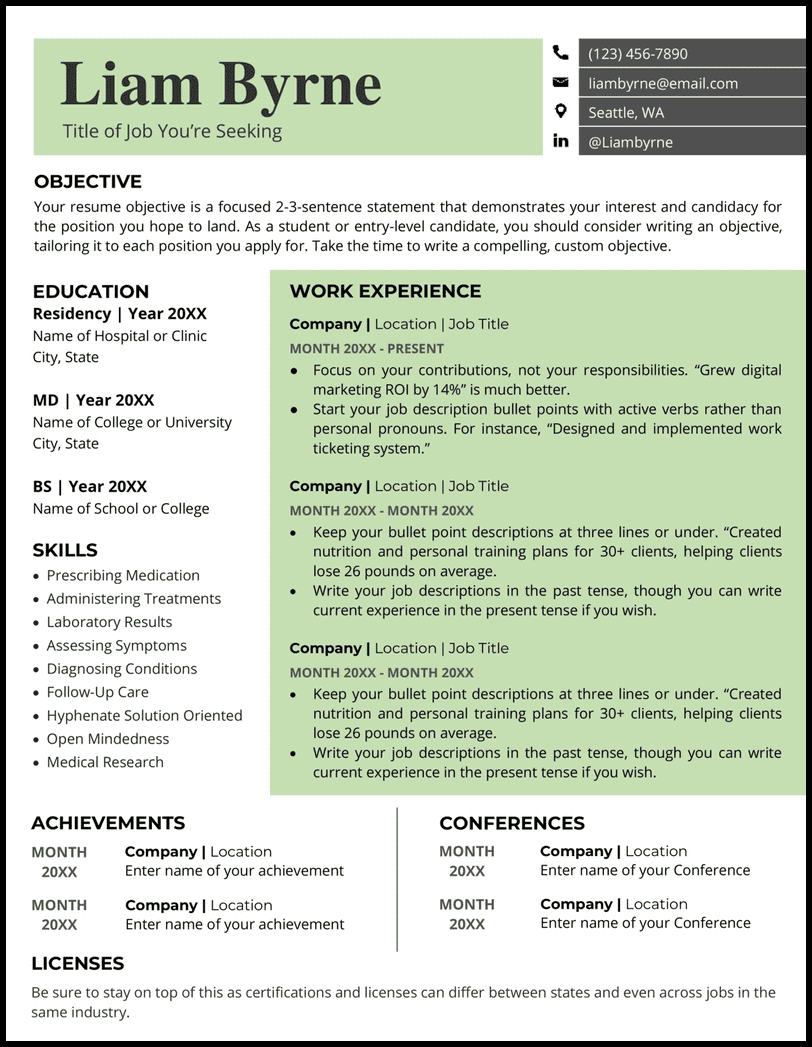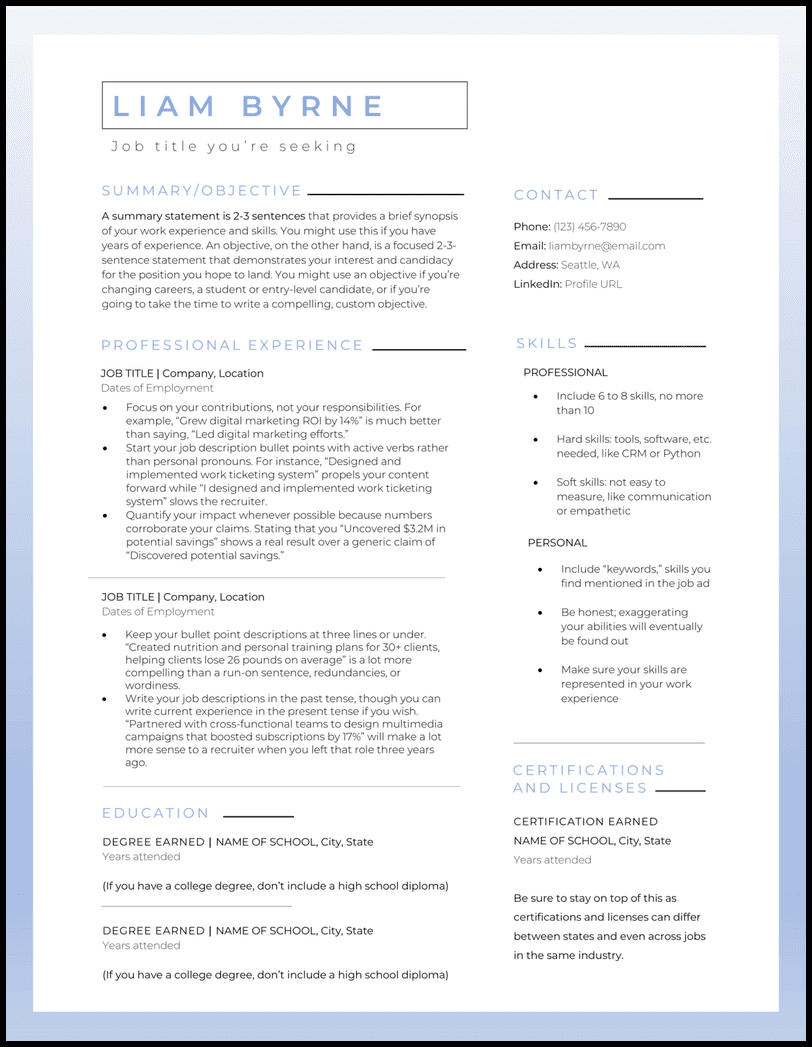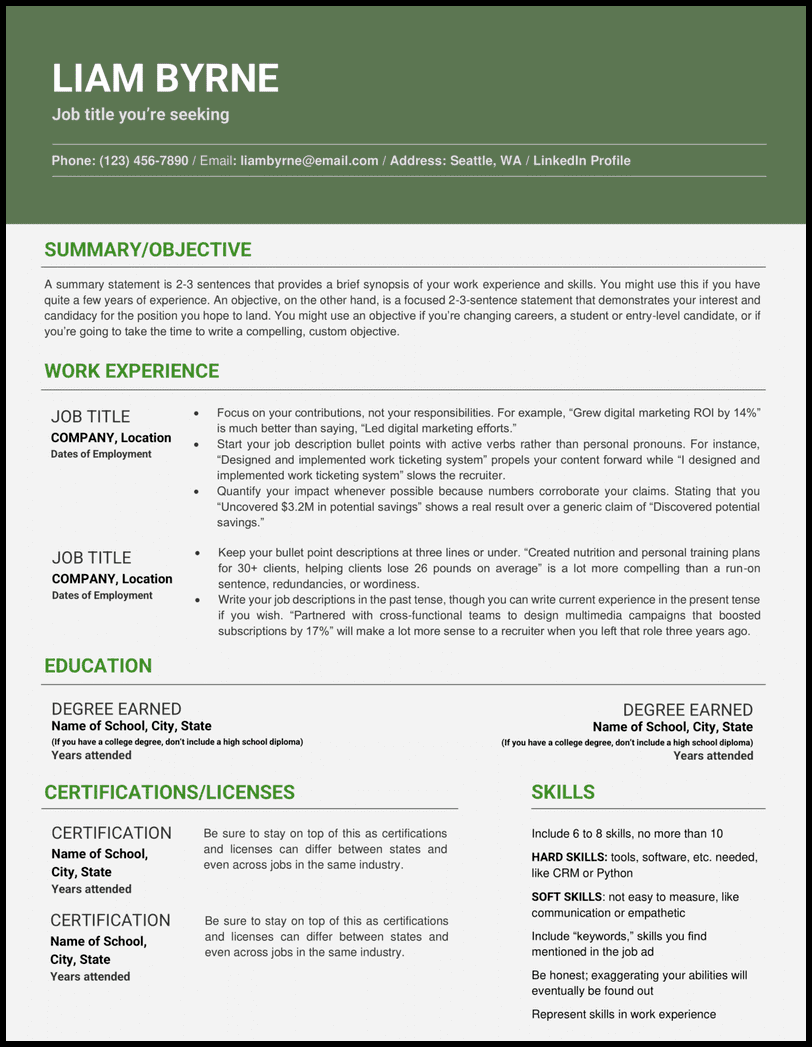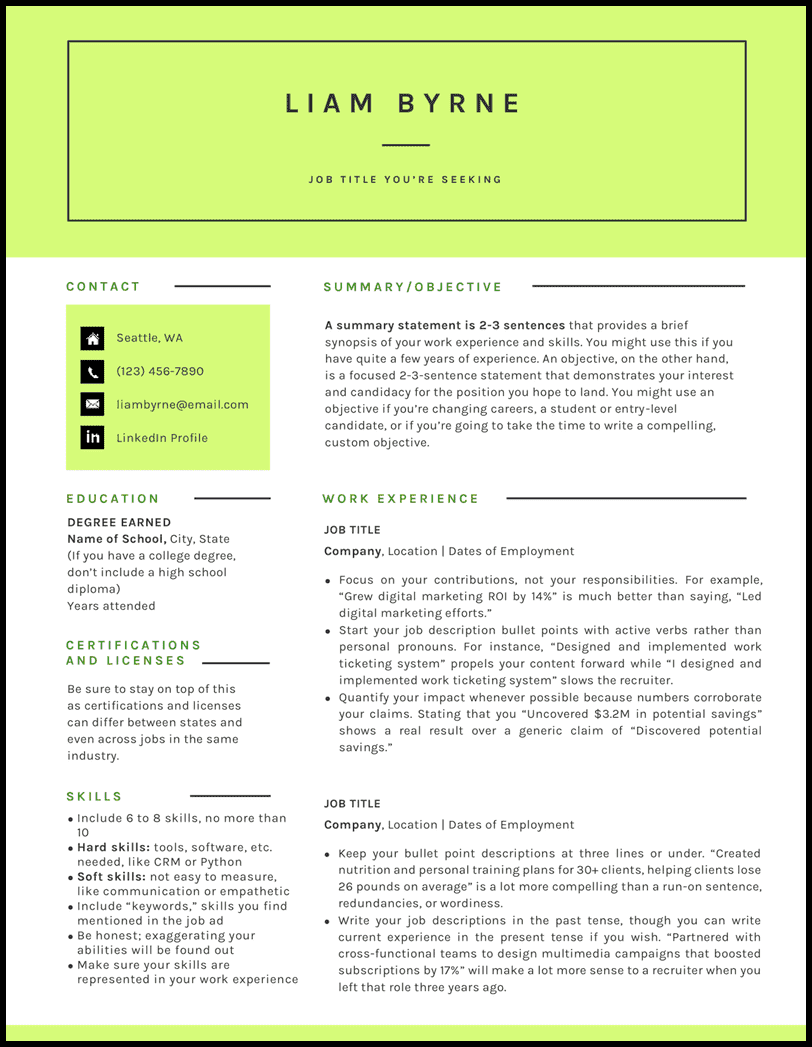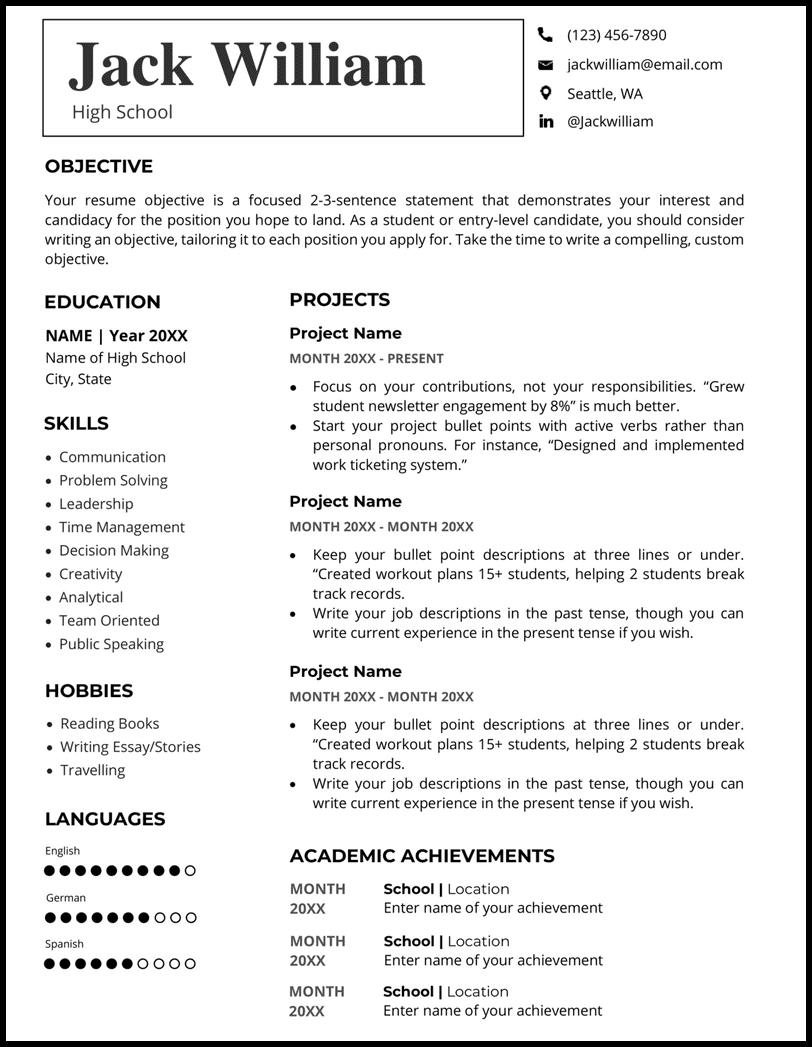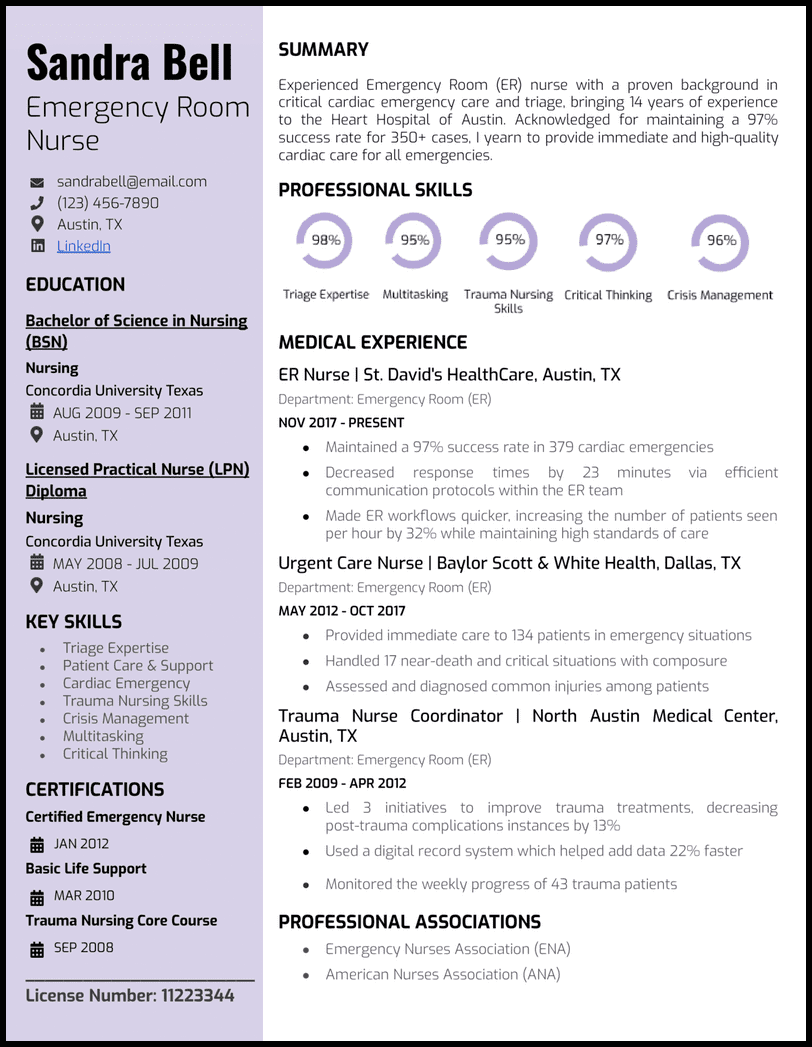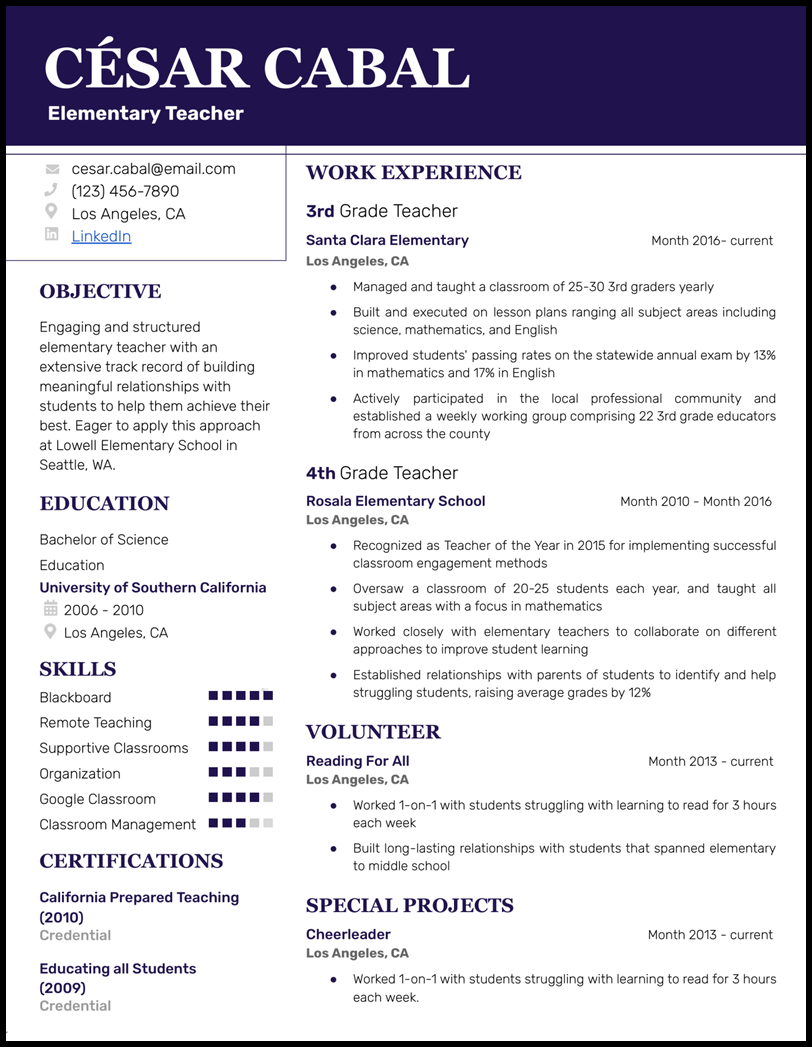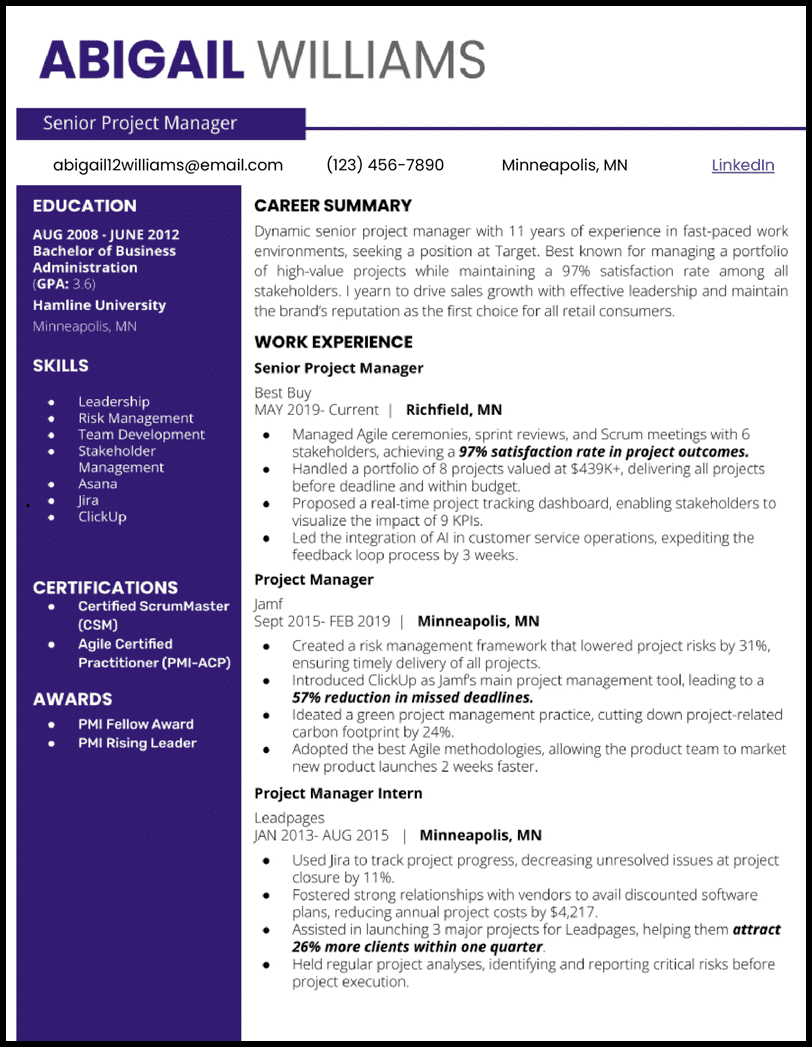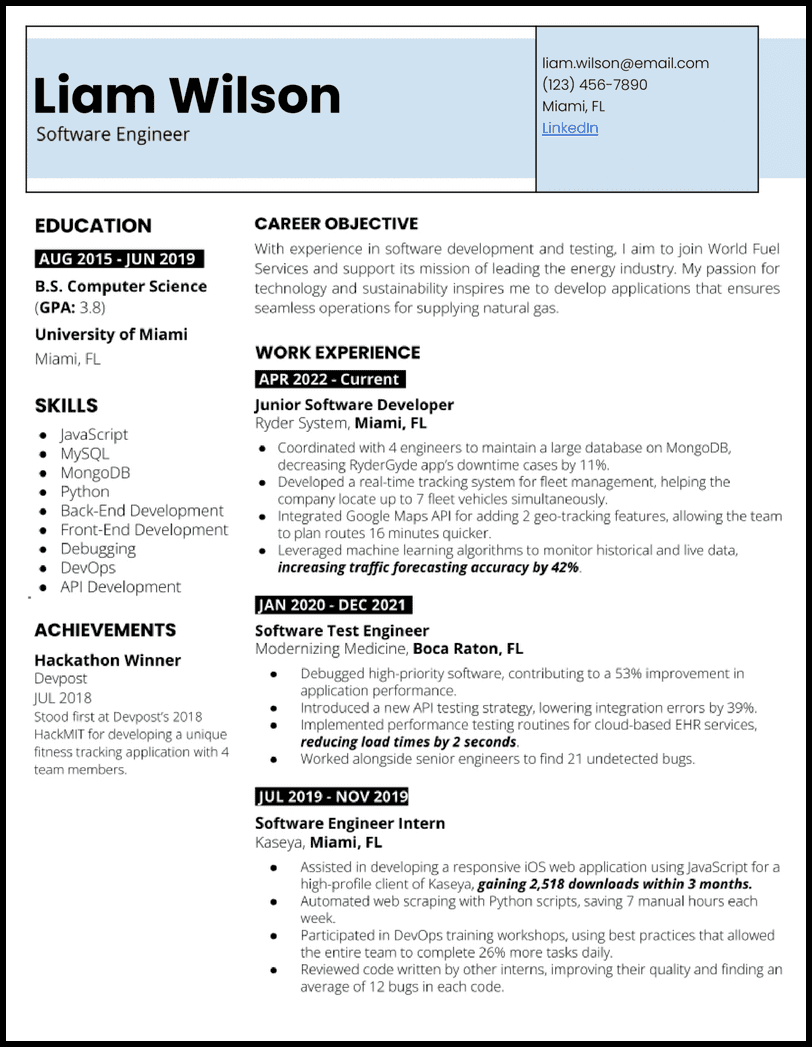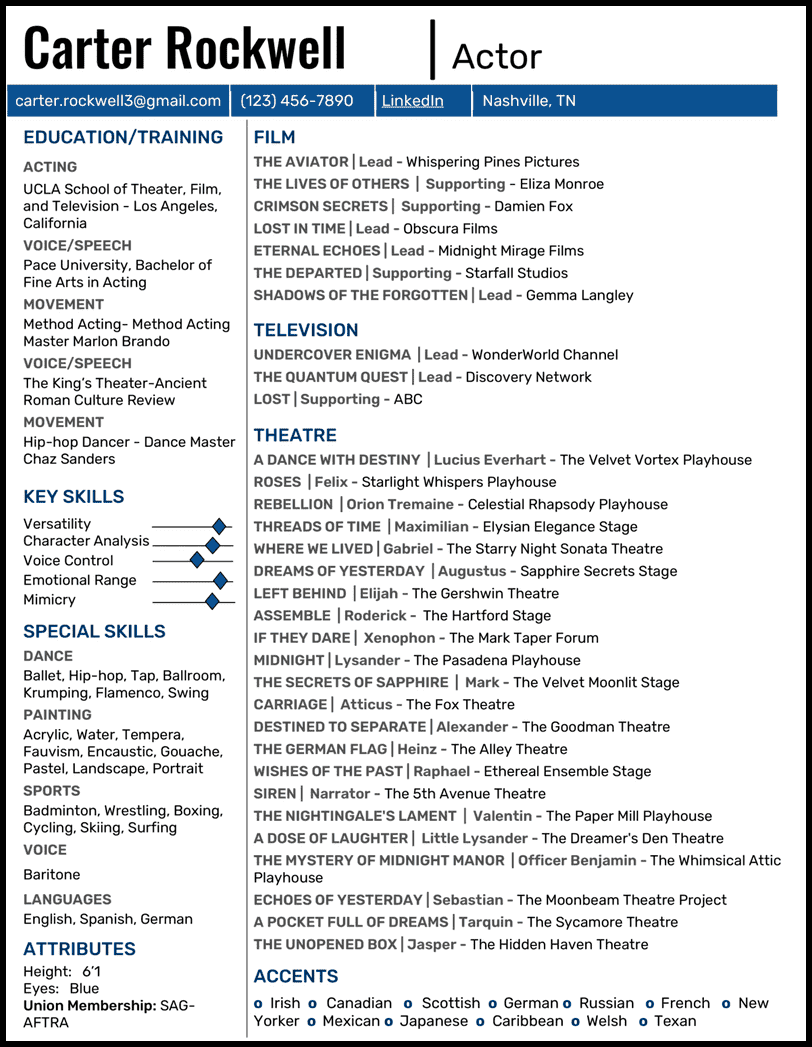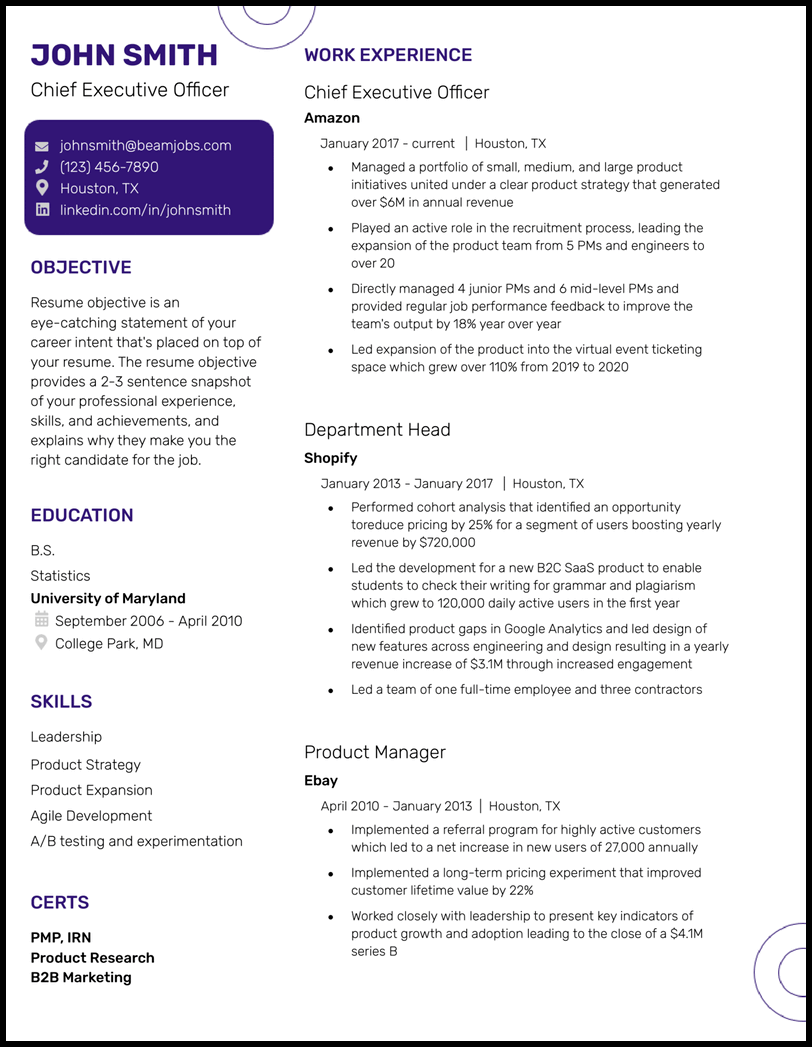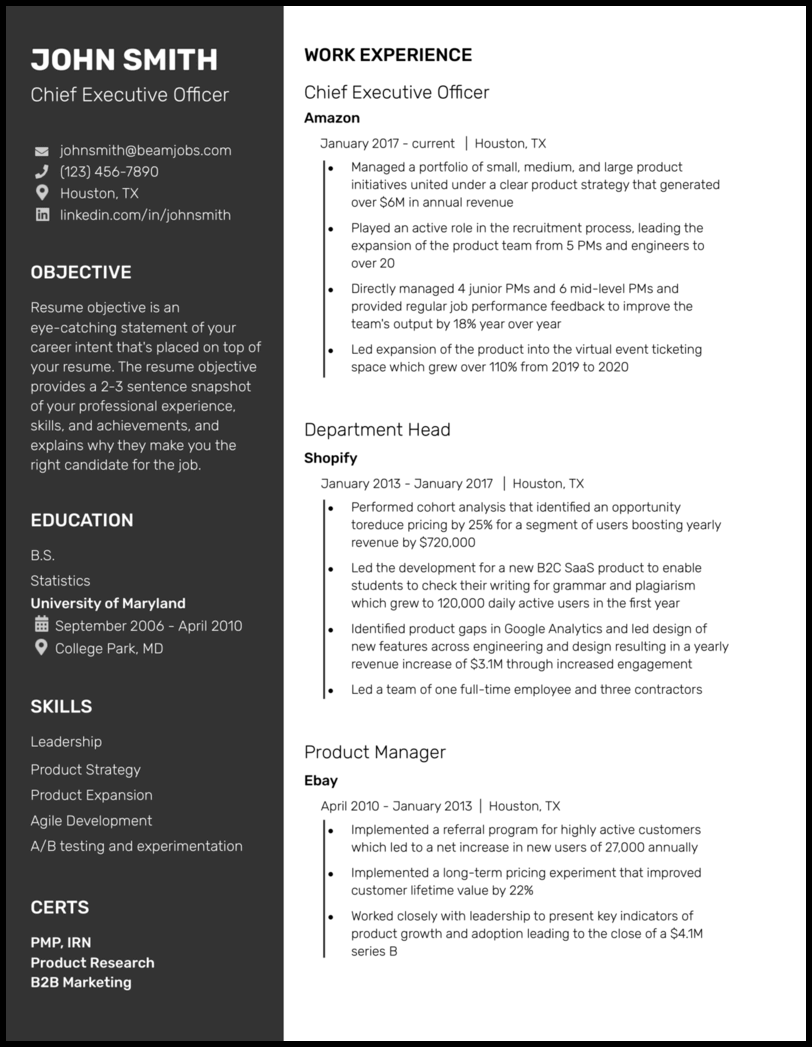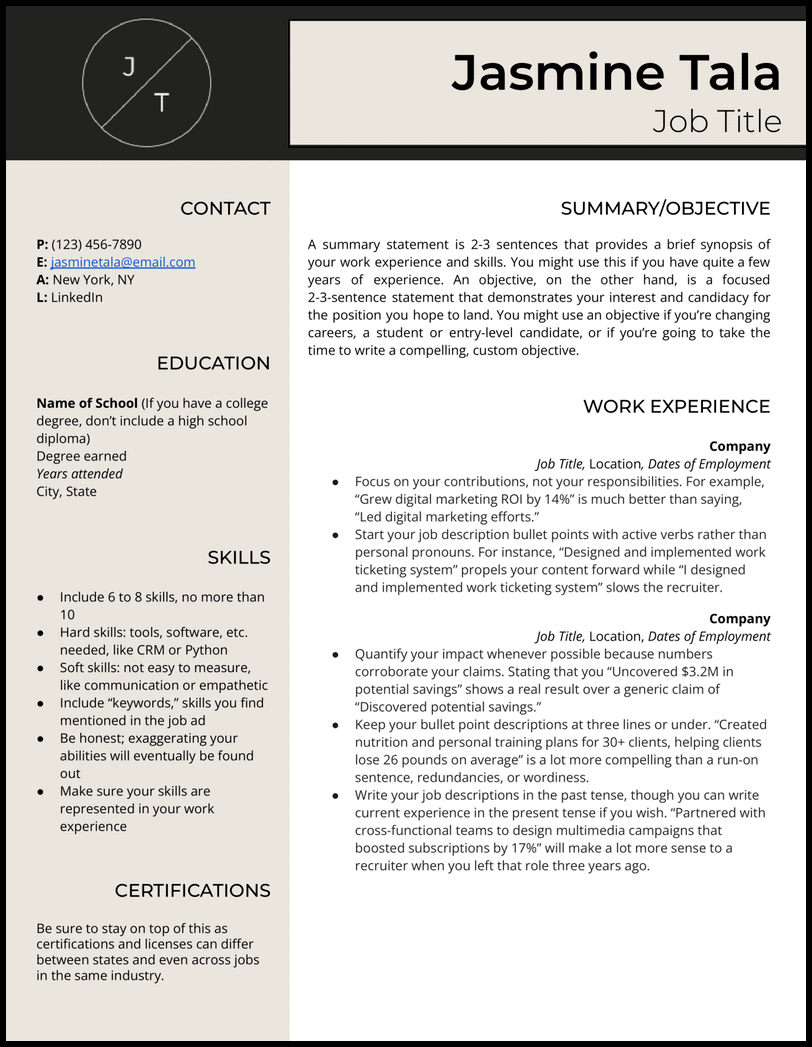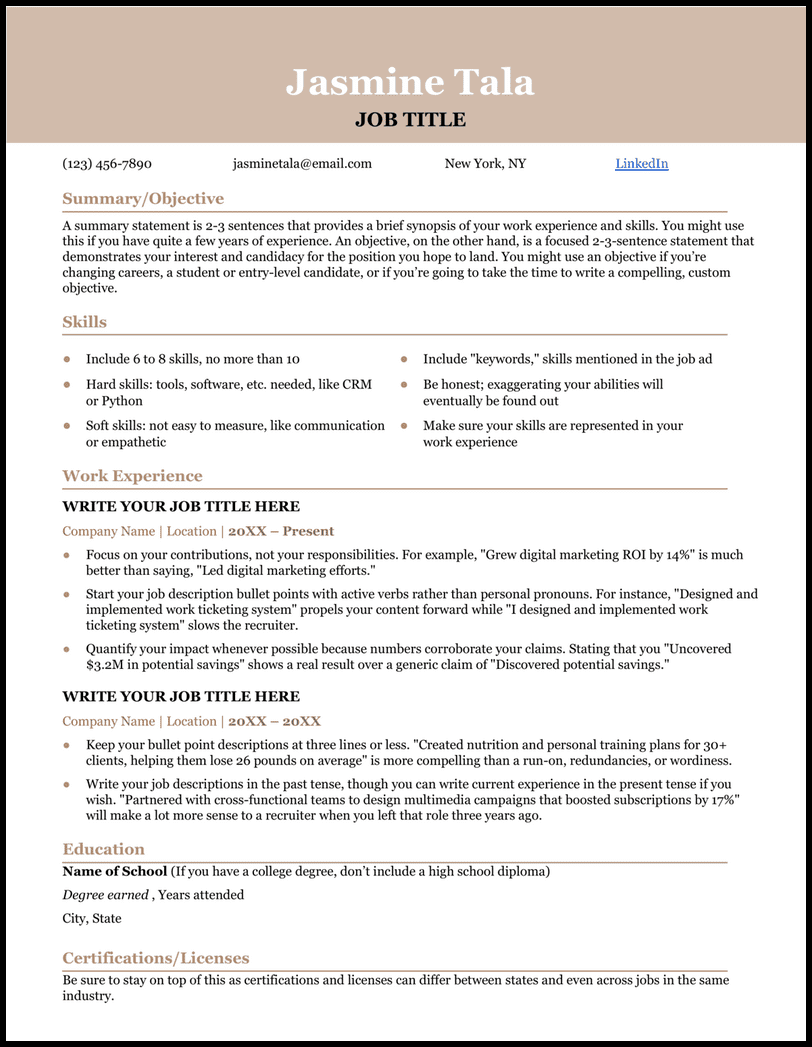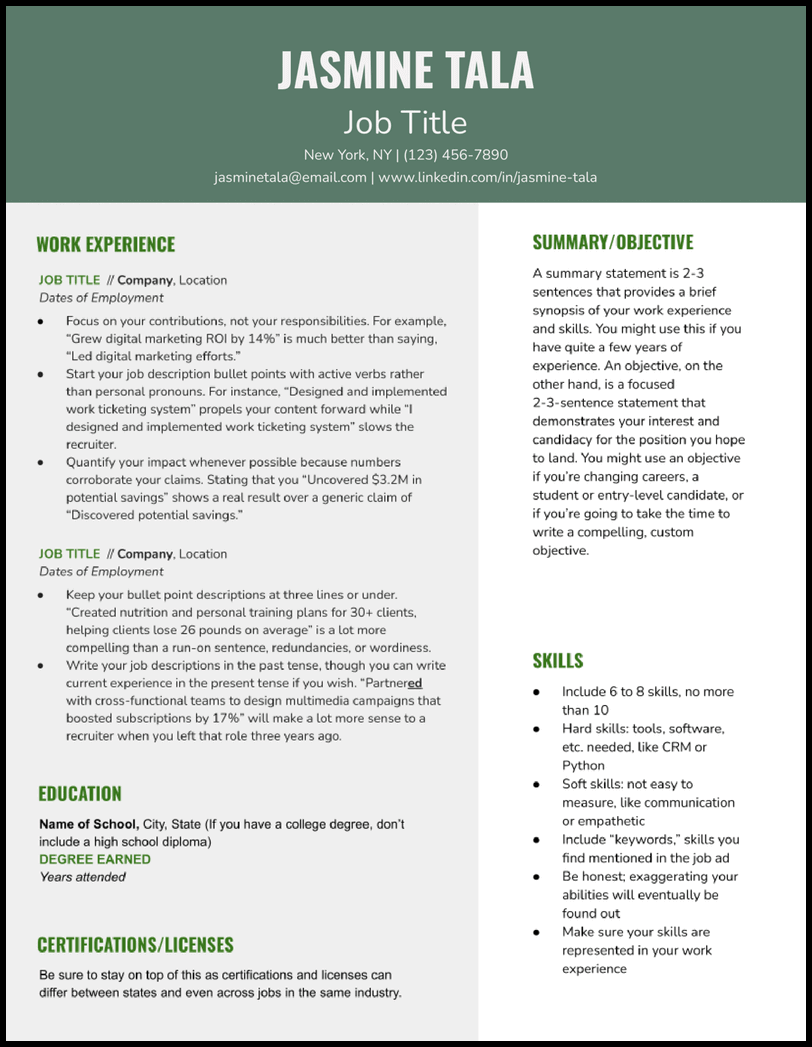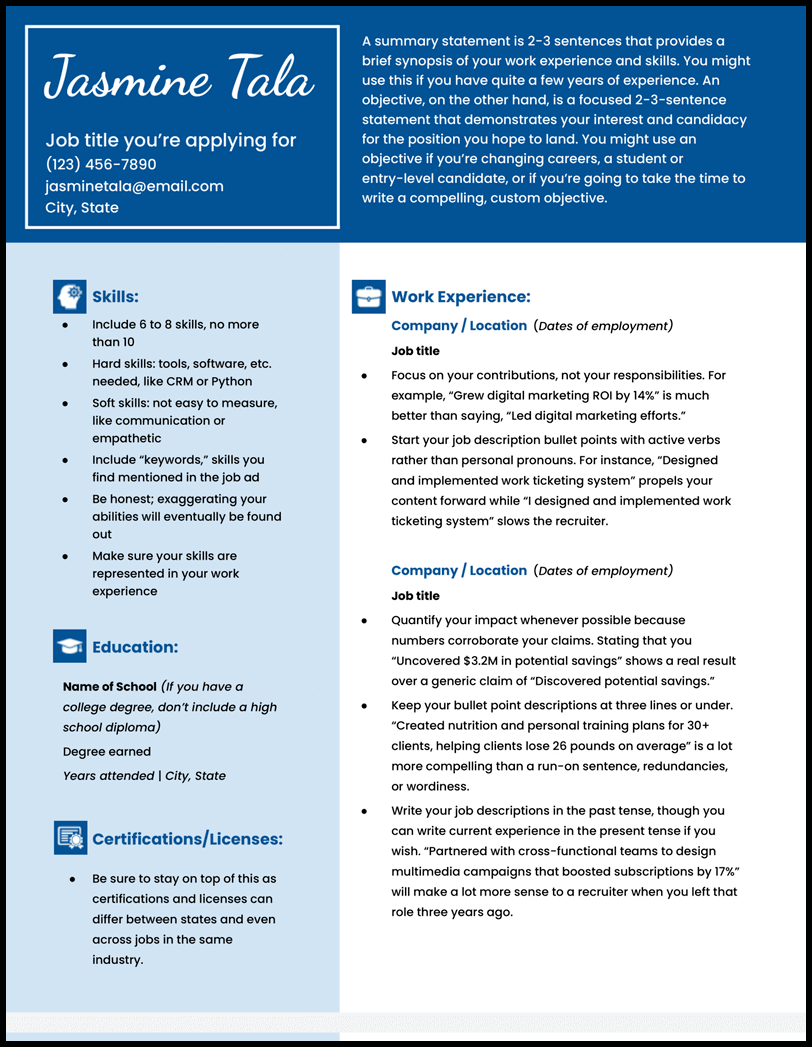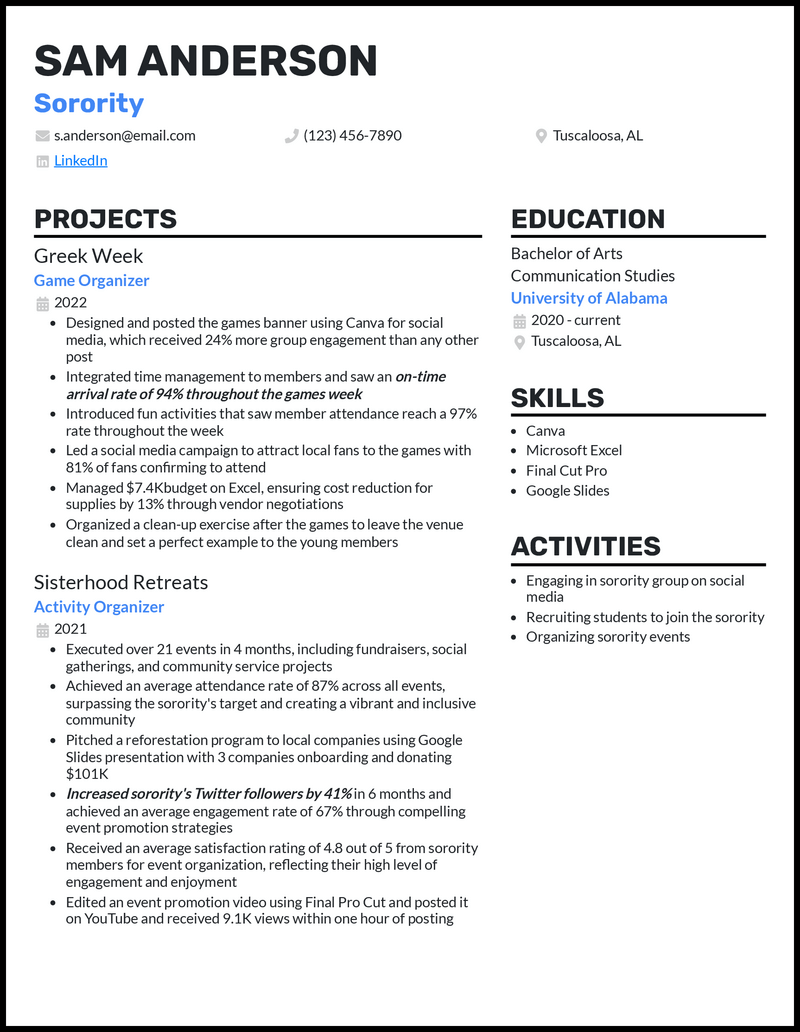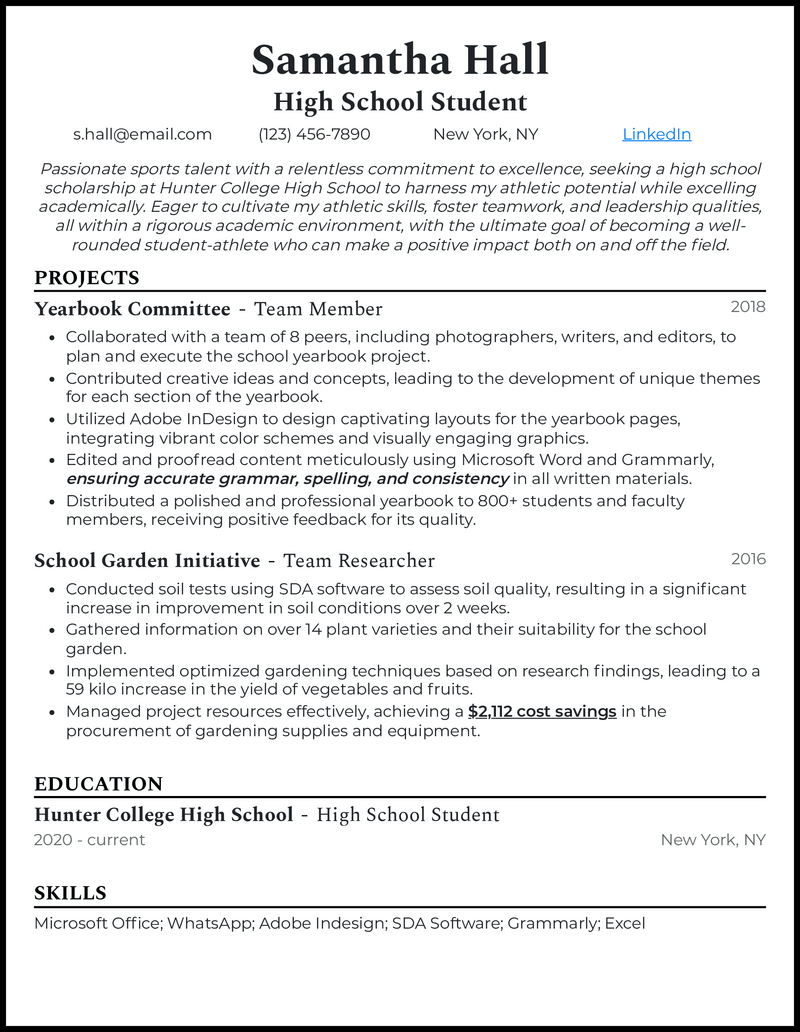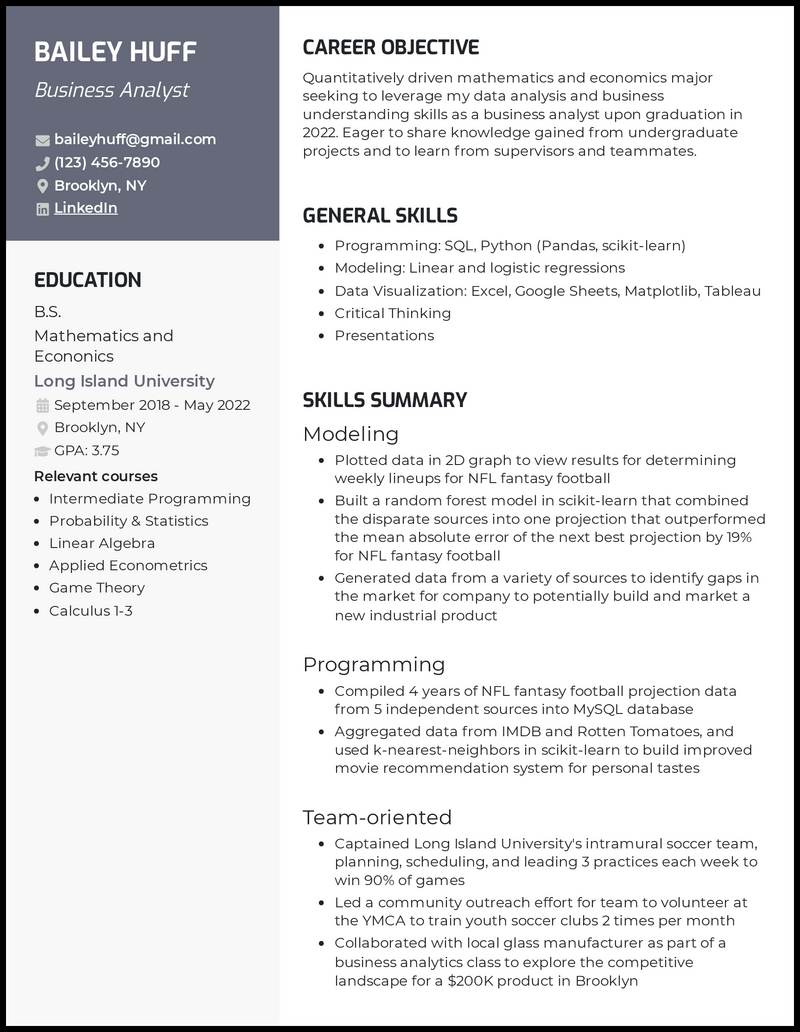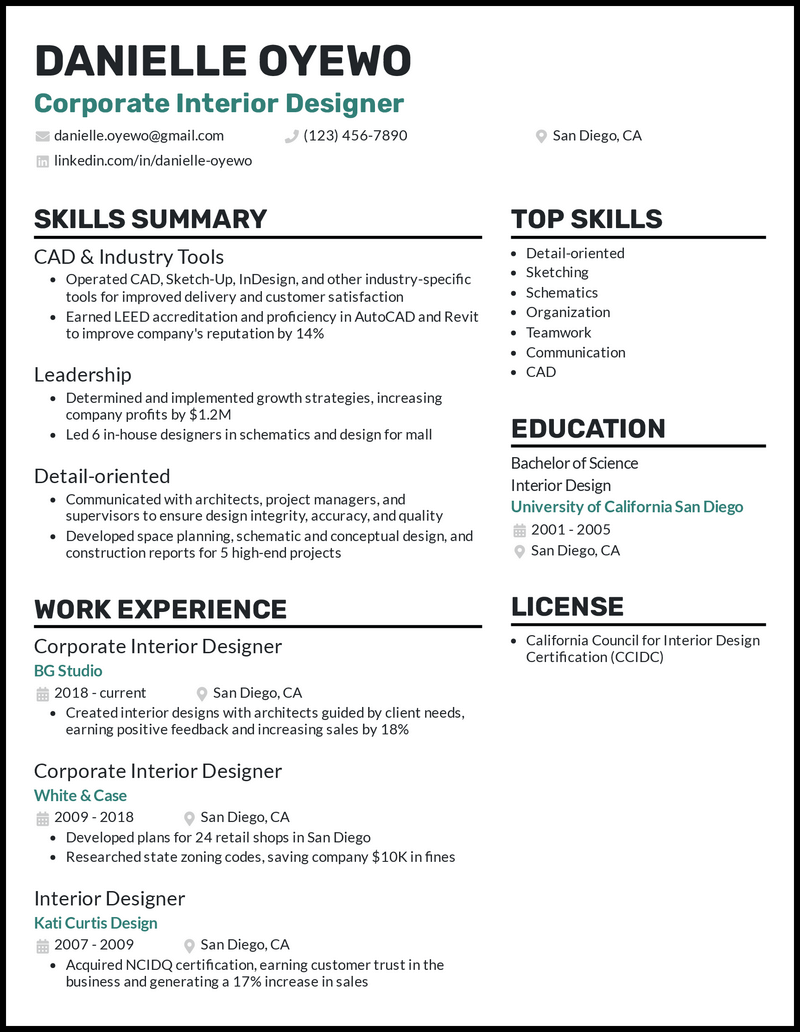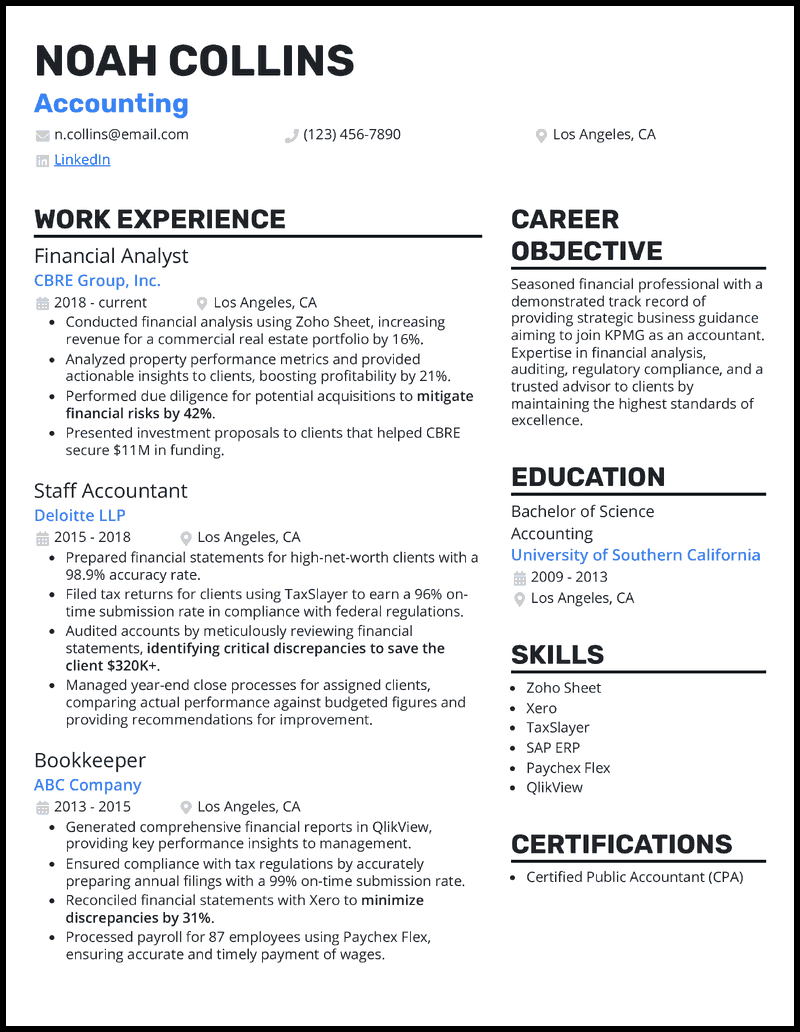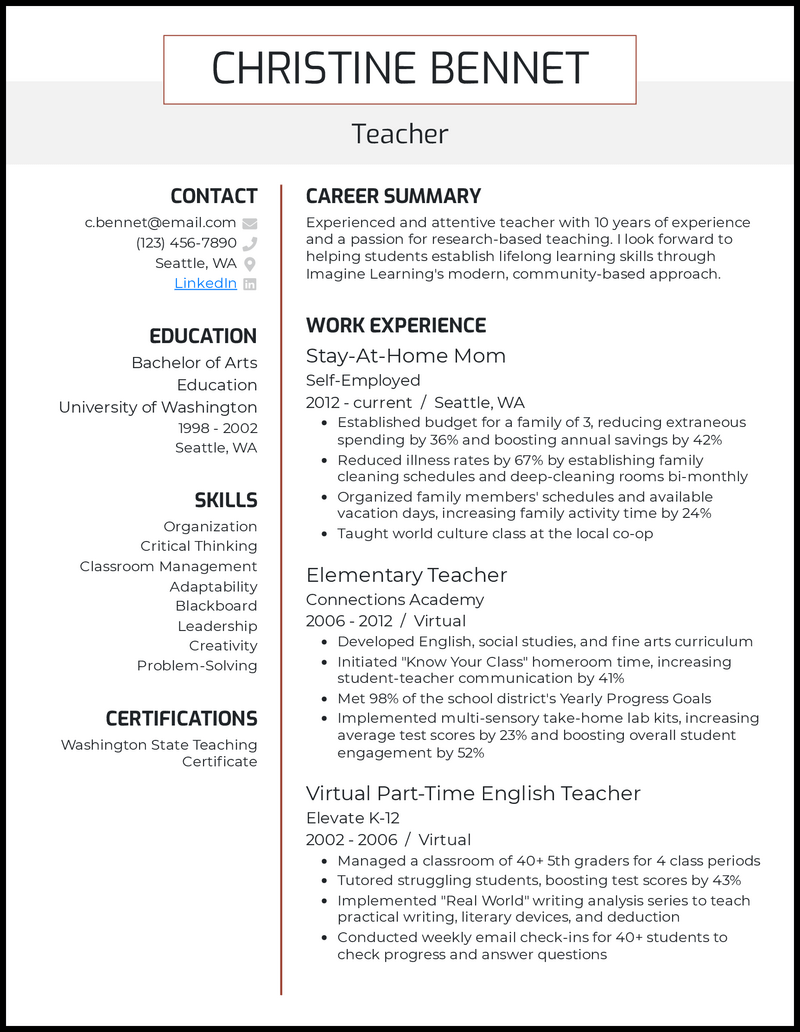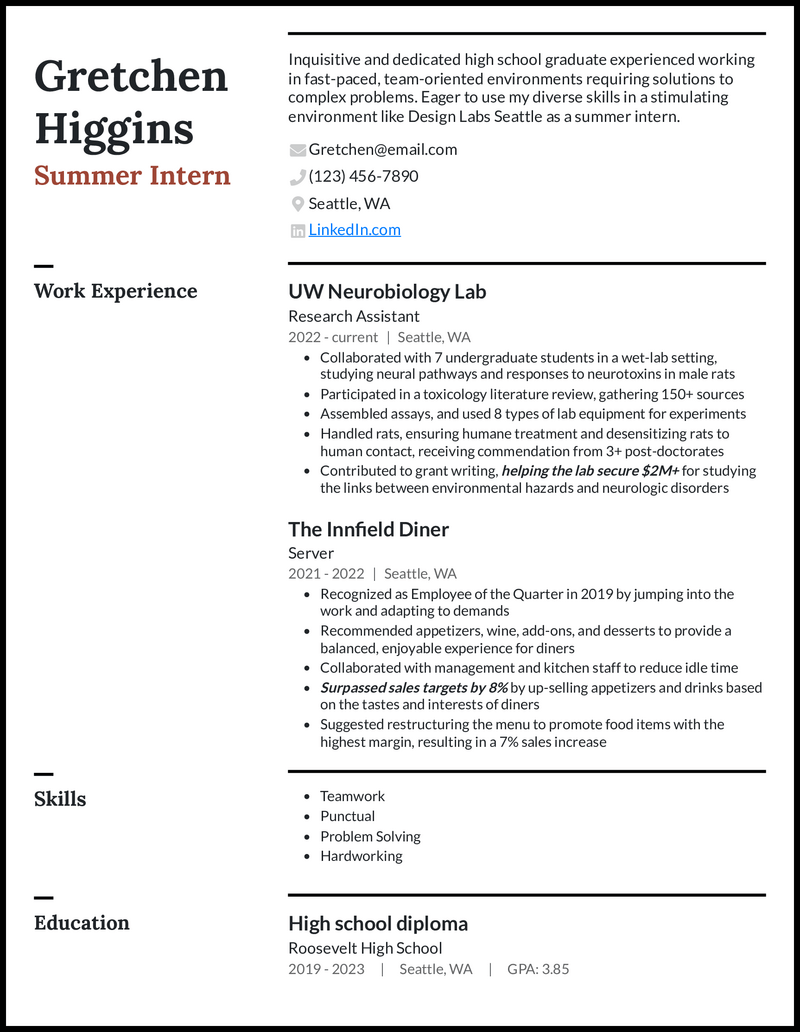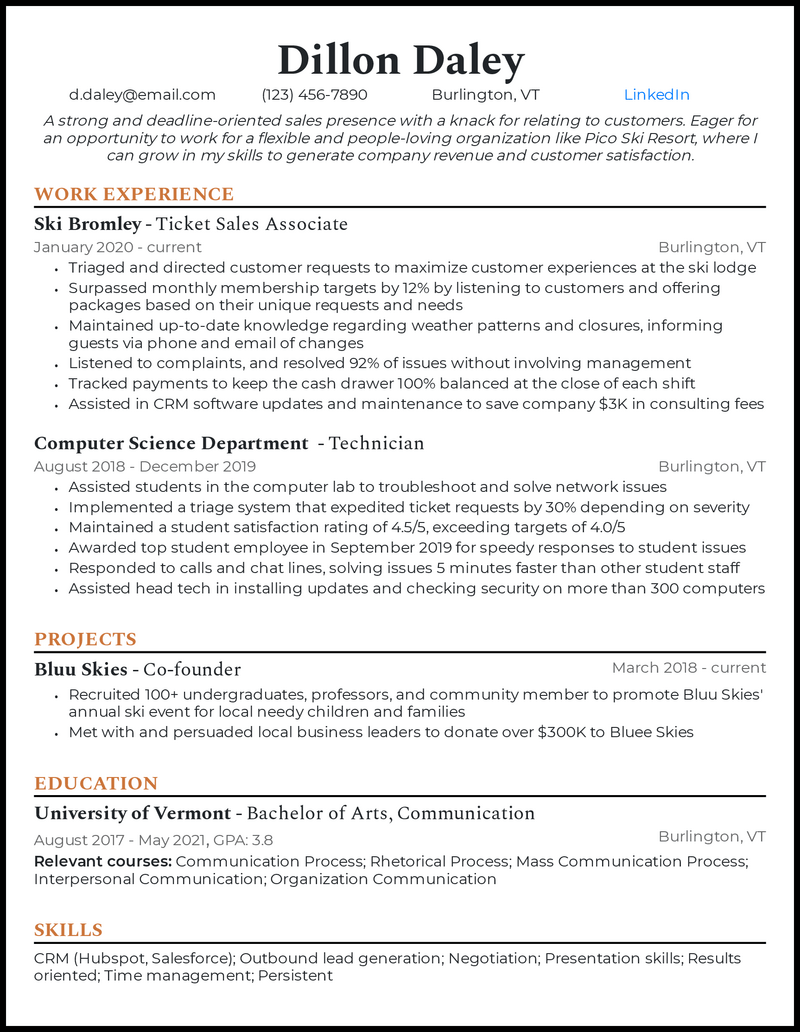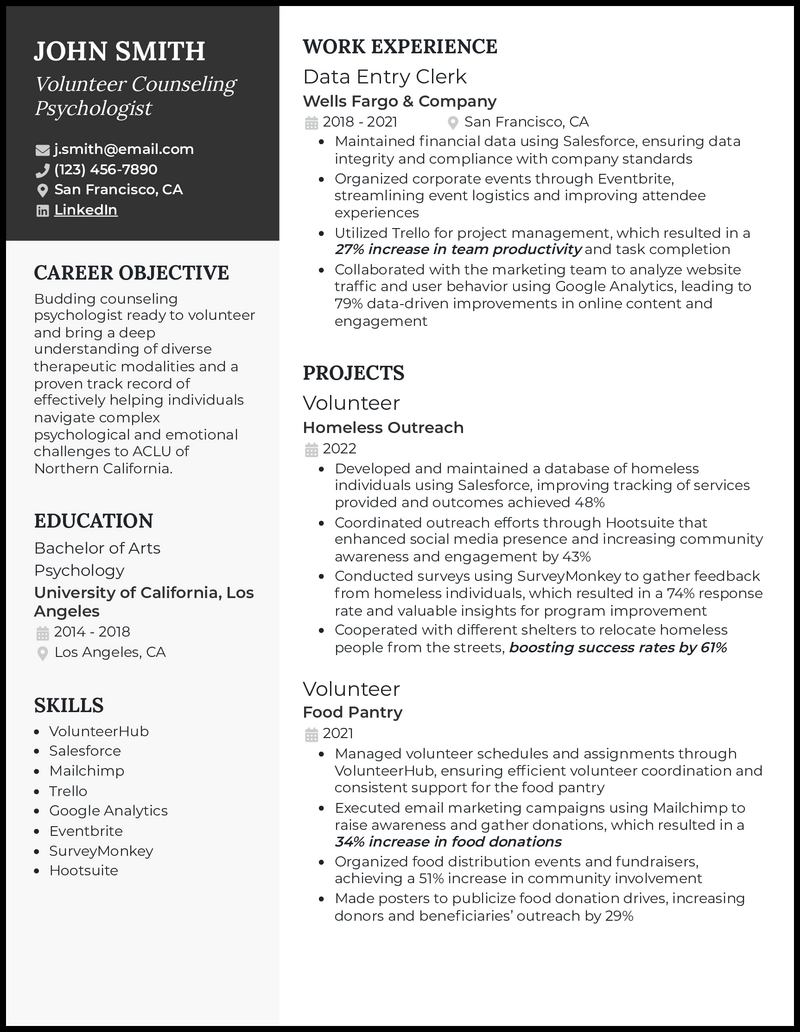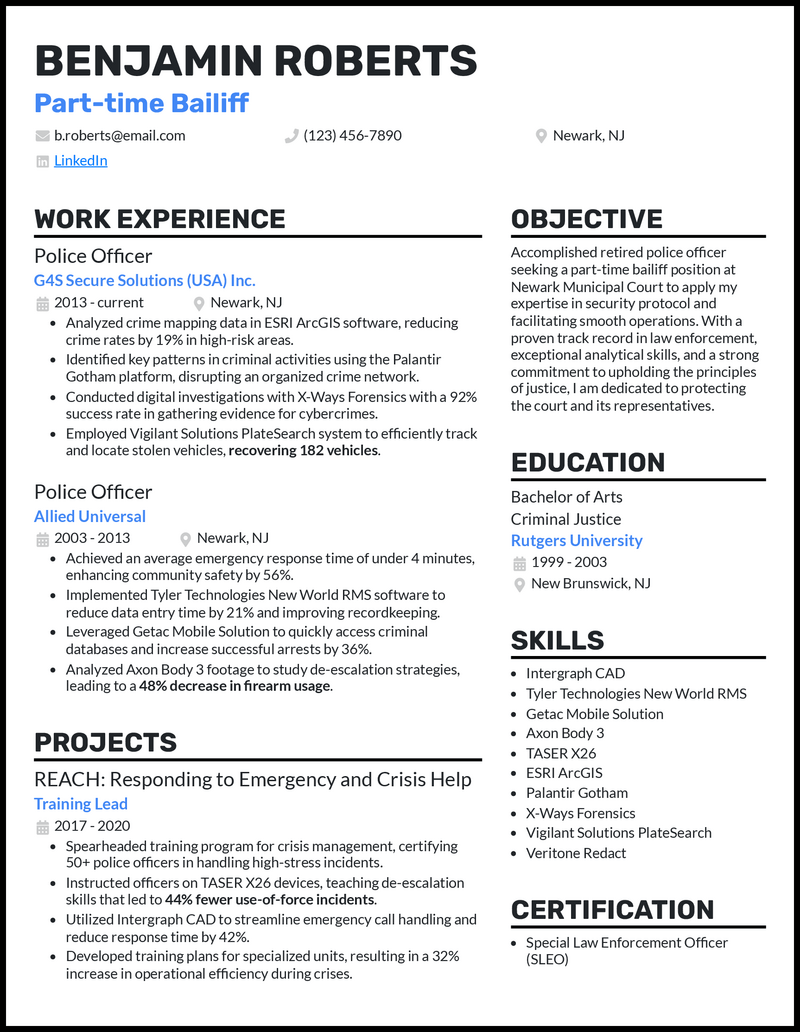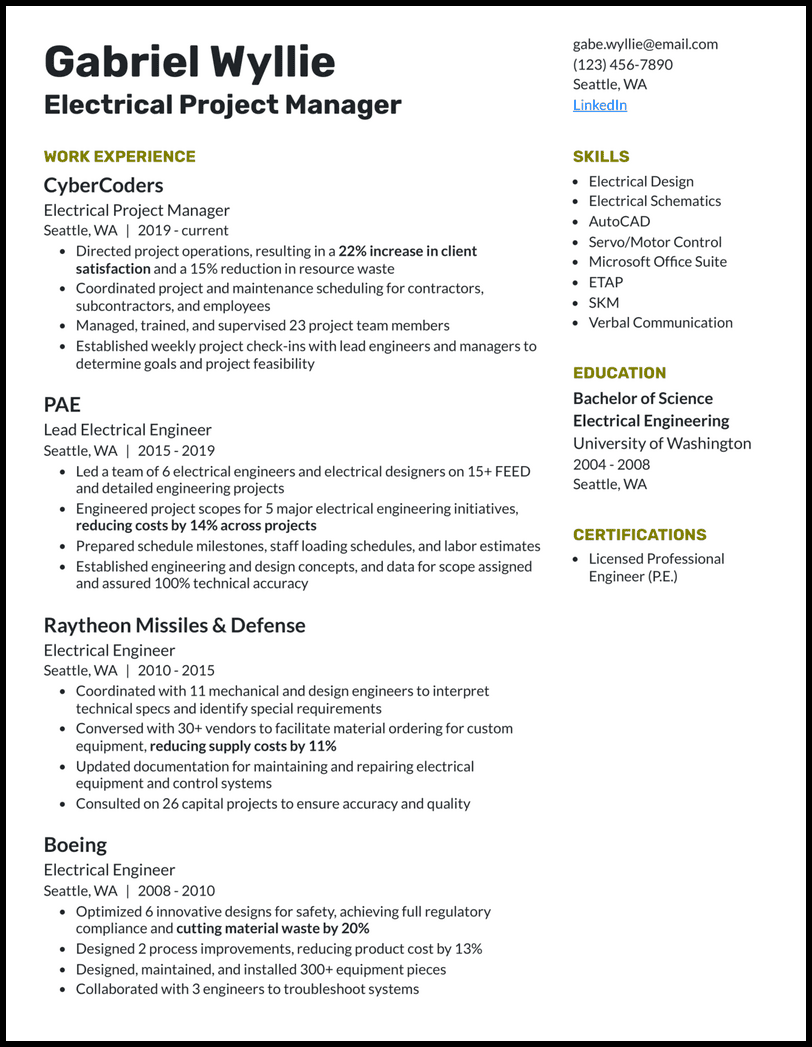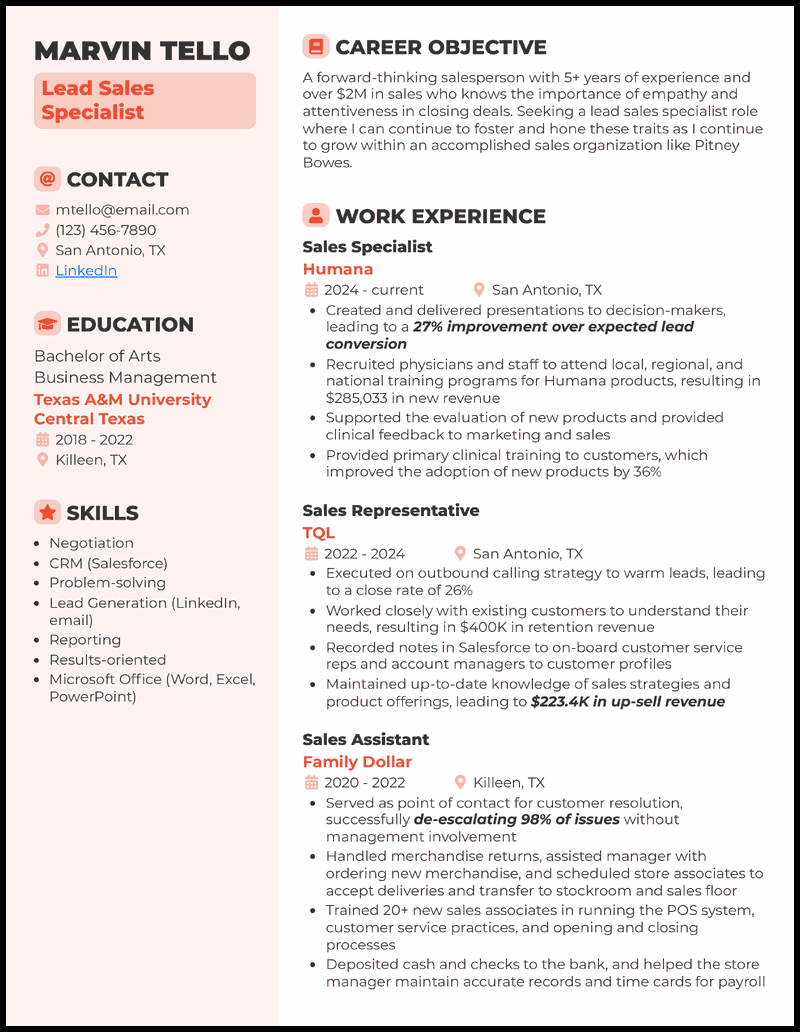Beam resume template – Best for those with proven experience
Innovative and creative industries will appreciate this beam of light, where you showcase your best accomplishments in this sleek design.
Elegant resume template – Best for senior and mid-level candidates
There’s plenty of room in our elegant resume template to add your professional experience while impressing recruiters with a sleek design.
Official resume template – Best for candidates with 3+ years of experience
With your job experience and a stunning resume layout, recruiters will be ready to give your application the official stamp of approval.
Standout resume template – Best for professionals eager to make a mark
Looking for one of the best resume templates? Your accomplishments are sure to stand out with these bold lines and distinct resume sections.
Professional resume template – Best for jobs requiring a traditional resume
A professional resume like this one communicates a more formal tone, but it’s unique enough to still leave a favorable first impression.
Classic resume template – Best for mid and entry-level candidates
Our classic resume template is anything but basic. A classic look can bring out your best work—whether for projects or traditional experience.
Minimalist resume template – Best for resumes with multiple roles
This minimalist resume template curtails lines and color, so it can maximize your job experience and highlight your professional achievements.
Compact resume template – Best for professionals light on experience
Lacking experience doesn’t mean you can’t make a good resume. A compact resume template can spotlight projects, internships, and school.
Modern resume template – Best for careers that encourage creativity
Browsing for creative resume templates for graphic design, photography, or event planning? Make a statement with this modern resume.
College resume template – Best for college students and grads
There is ample room for work experience and/or projects, making this an ideal template for both students and just about any job seeker.
Traditional resume template – Best for job seekers looking for a classic style
With a reverse-chronological format, this resume template is visually appealing. For an even more classic look, change the accent color to black.
Plain resume template – Best for seasoned professionals
Easily fit your extensive work experience in this template that emphasizes career history over education and skills.
Google Analytics resume template – Best for data-driven candidates
Inspired by Google Analytics, this resume template is a great fit for any job seeker looking to demonstrate their skills in data and analytics.
Entry-level resume template – Best for early-career candidates and those with no experience
Lacking job experience is no problem with this template. Discuss projects, internships, and highlight your education instead.
Education resume template – Best for teachers and school faculty
This is a great resume to showcase your teacher certifications, varied experience, and unique skills that set you apart in the classroom.
Dance resume template – Best for professional dancers
Dance resumes tend to follow a slightly different structure, so this template is designed with the industry’s standards in mind.
Chronological resume template – Best for job seekers of all kinds
This versatile template caters to nearly everyone. Its reverse-chronological format makes it easy to present your most relevant role to recruiters.
Academic resume template – Best for academic fields like research
This template is ideal if you need room to discuss research experience, as well as personal and/or academic project experience.
Business resume template – Best for business development and finance roles
While this template will work for many roles, it was especially designed to showcase the experience for those in business and finance.
Functional resume template – Best for job seekers with career gaps or limited experience
Functional resumes allow you to focus on using your skills in the context of a project or work experience rather than the other way around.
Best resume template – Best for entry-level job seekers
This template effectively uses white space to include a couple of roles or projects, along with an objective that communicates what you can bring to the table.
Basic resume template – Best for job seekers of all kinds
While basic, this template is pleasing to the eye, ordered logically, and offers ample space for work experience, education, and skills.
Sorority resume template – Best for potential new members of sororities
This niche template works well for college students preparing to rush. The earlier you can submit your resume and pre-recruitment packets, the better.
Pet resume template – Best for pet owners documenting their pets
If your apartment complex or workplace allows pets, building a pet resume is a smart choice to communicate basic requirements.
Student resume template – Best for high school and college students
This fun template is a great choice for high school students who need to showcase volunteer work, projects, and even hobbies.
Professional resume template – Best for job seekers applying to traditional jobs
This well-structured template is easy to follow with is professional, clean-cut appearance, making it a strong choice for formal roles.
Acting resume template – Best for acting and theatre candidates
Specifically designed to showcase acting experience, training, and awards, this template hits all the standards of the industry.
Technical resume template – Best for technical job seekers
Emphasize technical skills in this resume template, which is a strong choice for engineers, analysts, and project managers.
Harvard resume template – Best for students or recent grads and research or academic candidates
This template emphasizes education and leadership, ideal for job seekers with limited experience who are applying to Ivy League programs.
Minimalist resume template – Best for job seekers of all kinds
There’s nothing to get in the way on this template. Simple thin lines make the sections of this resume clear and easy to read.
ATS-friendly resume template – Best for job seekers applying to large companies
Many large companies use applicant tracking systems (ATS) to filter candidates. A basic resume without fancy fonts or icons is the way to go.
Modern resume template – Best for career changers
This template includes healthy space for an objective statement to allow you to explain transferable skills.
Simple resume template – Best for job seekers in more traditional roles
Sometimes black and white and simplicity are best. If applying for more formal roles in finance, business, etc., this is a solid pick.
Easy resume template – Best for sales-oriented job seekers
Blue is always easy on the eyes, and the space for awards lends itself to showcasing some of your greatest achievements in sales.
Music resume template – Best for musicians and artists
This template is ideal for including your orchestra experience, honors and awards, education, and other professional experience.
Teacher of the Year resume template – Best for educators, especially elementary teachers
Fun accents, colors, and design elements on this resume template will help bring your personality to life as a teacher.
Pretty in Pink resume template – Best for leaders who want a touch of femininity
This light pink offers a subtle, feminine touch while still showcasing a powerful career history. Easily add extras, too, like certifications and a summary.
The Trades resume template – Best for job seekers applying to the trades
Designed specifically with trade jobs in mind, such as welding, HVAC, and construction, this template provides space for apprenticeship work.
Doctors’ Orders resume template – Best for healthcare professionals
Emphasize your work experience, but also have room to list your education, skills, achievements, conferences, and licenses.
Executive resume template – Best for executive and C-suite job seekers
With a touch of elegance, this resume template has an “executive” feel, providing room for your summary statement and all the necessary details.
Green Technicalities resume template – Best for tech-focused roles
Place a focus on your technical skills in the hard skills category, and highlight the certifications you have that make you stand out.
Modern Limelight resume template – Best for creative roles
While not overpowering, the lime green accent colors make a bold statement. This template is a good choice for highlighting your creativity.
High School resume template – Best for high school students
This template is designed with students in mind who lack job experience. Instead, highlight personal and academic projects that demonstrate your value.
Nursing resume template – Best for healthcare professionals
Recruiters can quickly view nursing credentials and medical experience in this template, characterized by a light purple column.
Teacher resume templates – Best for elementary, junior high, and high school teachers
Professional, yet stylish, this resume template can help bring your teaching career to life regardless of the grade or subject you teach.
Two-column resume template – Best for job seekers of all kinds
All the important resume sections are here, and the bold left-hand column makes it easy to keep the sections distinct.
Software engineer resume template – Best for software engineers
Keep your tech experience professional and clear with this template that even includes a place for achievements like your hackathon win.
Theatre resume template – Best for actors and theatre candidates
If you’ve got a diverse acting history, this template might be the right choice to showcase your many roles, training, and special skills.
Blue Bubble resume template – Best for job seekers of all kinds
Subtle bubble designs on this template frame the most important section of your resume: work experience. Made to make a statement.
Timeline resume template – Best for mid- to senior-level candidates
This is an excellent template for job seekers who want to show career progression, as the timeline helps recruiters focus on your most recent role.
Elegant resume template – best for design-conscious job seekers
This tasteful template can complement your work experience if you’re in a creative field such as interior design, fashion, or art.
Classy resume template – Best for corporate job seekers
An earthy color palette and a one-column resume format are a great combination for more formal roles and companies.
Bold resume template – Best for entry- to mid-level candidates
Bold yet professional, include early job experience along with an objective statement that attests to your skillset.
Creative resume template – Best for job seekers in creative industries
Show off your personality with shades of blue and fun icons to separate resume sections while maintaining professionalism.
Built to Pass Through the ATS 
When you enter our AI resume maker, you can have total confidence that the resume template you choose is ATS-friendly. Get the green light from the bots so real people can see what an incredible candidate you are for their company.

Creative & Professional Templates 
Whether your industry calls for a creative design and a bold pop of color or a more subdued and traditional resume style, we have you covered. Our standout resume templates are all professional while giving you the freedom to choose.

AI-Powered Tools to Make Life Easy 
Kill two three birds with one stone. When you select a resume template, you can build a resume (and customize it) with the help of AI, score your resume with feedback to improve, and put a bow on it with our free AI cover letter generator.

Designed with Your Profession in Mind 
No matter the resume template you pick, you can fully tailor it to the job you want. Start editing a template to leverage our bullet point generator for job-specific examples of responsibilities and achievements to inspire your resume.

Fully Loaded Customizable Templates 
Eeny, meeny, miny, moe—Don’t like your template? Pick a new one! Want a different color or font? There’s plenty for the choosing. Need to add a custom section to your resume? Add it, title it, and re-arrange it to make it your own.

Download & Print in PDF or Word 
A resume template is only as good as the finished product. Downloadable free resume templates in PDF or Word make it a cinch to print for a pixel-perfect career story that’s sure to snag the attention of recruiters and hiring managers.

Resume Templates
by Format & Style

Sometimes you need a traditional resume, and sometimes you need a resume that’s particular to a certain circumstance or job. Whether you need to showcase your work on the stage or apply for a scholarship, you can download free resume formats to support your specific goals.
Resume Templates
by Experience & Life Situations

Download our free resume templates that support you at any stage of your career journey. From a high school student to a retiree and an entry-level candidate to a career changer, find the inspiration you need to showcase your unique experience, talents, and achievements.
Resume Templates
by Profession & Role

Different career types have different resume requirements. A nurse applying to a large, old-school hospital is going to need a different resume template than a programmer applying to a tech company. Download a resume template (PDF) to make that selection process easier for you.
Customers love our attractive resume templates and say our customer service is unmatched. Job Seekers Are Finding the Perfect Resume Template

Choosing the Best Resume Template

Picking the right resume template depends on your experience, the industry, and the company’s culture and environment. Here’s a quick way to choose:
- Are you applying to a large company or one that hires frequently? Make sure you use an ATS-friendly resume template.
- Are you applying for an industry that welcomes creativity and original thought? Choose a modern, creative, or colorful template.
- Are you applying for a more formal and white-collar role? Professional, corporate, or simple templates will be the best fit.
- Are you applying for entry-level positions or hoping to land your first job? Student and entry-level resume templates are the ideal pick for you.
- Are you applying for jobs in one of these specialized fields? Choose from our tech, healthcare, and education templates.
Sections of a Resume Template

There are four main sections that a good resume template will have. These are non-negotiable, so make sure the template you choose has the following resume sections:
- Contact header: Besides spelling your name correctly (yes, misspelled names are a common faux pas), make sure a recruiter or hiring manager can reach you! Provide a good phone number and a professional-sounding email address.
- Work Experience: The debate’s been settled on this one—this section is the most vital on your resume template. If your experience doesn’t tell a story that relates to the job description, the odds are definitely not in your favor.
- Skills section: And this is arguably the second most important resume section. It’s fine if your resume template doesn’t leave a ton of space for a skills section because you want to cap it at about 8 to 10 skills anyway. Any more than that, and you may be giving off red flags.
- Education: Where you place education usually depends on your experience level and whether the job description emphasizes it. But no matter how you slice it, education is a section that should be on any basic resume template.
Optional resume sections
When you make a resume with us, you’ll have plenty of freedom to customize your resume sections. Besides getting what we’ll call the “Core Four” resume sections mentioned above, you’ll be able to re-arrange them as it makes sense.
You’ll also be able to add and create new sections, such as
- an objective or summary statement
- projects or volunteer work
- certifications
- awards
Resume Templates FAQs

What is the best resume template to use?
The best resume templates usually order work experiene in reverse-chronological order, are designed with clear sections and headings, and avoid complex tables and graphics that make it hard for ATS to read.
- Reverse-chronological formats present your most recent, and usually most relevant, experience first, getting your experience immediately in front of recruiters’ eyes
- Clear sections and headings keep your resume scannable and organized for easy reading
- Simple fonts, plain bullet points, and minimal graphics mean that your resume will pass through ATS and get to human eyes more quickly
Are BeamJobs resume templates free to download?
Yes, you can download any BeamJobs resume template for free in Word or Docs. If you choose to customize your resume in our builder, downloads do require a paid plan.
Which resume template is best for ATS?
ATS cleanly parse and understand resumes that use simple fonts, like Open Sans or Garamond, and avoid complex tables, graphics, and images. Our nine BeamJobs-official templates found at the top of this page and in our AI resume builder are all designed and tested to pass through ATS.
What’s the best resume template for someone with no experience?
A student or entry-level resume template is ideal for someone lacking work experience. These templates will either include (or you’ll have the option to add) sections for projects, internships, volunteer efforts, and other extracurricular activities.
What resume template is best for creative vs. formal roles?
Modern, colorful, and unique resume templates often work for creative industries, while formal industries tend to appreciate simple, professional layouts with clear section headings and minimal extras.
If you’re pursuing a role in graphic design, photography, marketing, or something along those lines, a creative resume template may be ideal. On the other hand, you may be better off choosing a more minimalistic resume template for traditional and corporate roles.
How long should my resume template be?
Generally, you should use a one-page resume. There is a lot of disagreement in the industry regarding whether it should be one or two (or even more) pages. While we acknowledge this, we personally advocate for a one-page resume because:
- The data supports our position: A study from 2018 (definitely time for a new study) concluded that recruiters spend 7.4 seconds per resume upon initial screening.
- Resumes should offer value, not fluff: Someone with entry- to mid-level experience likely won’t have sufficient experience to fill two pages anyway.
A two-page resume, if you feel you must use it, is best for candidates with 10 or more years of extensive experience. Regardless of whether you use a one- or two-page template, avoid cramming your resume with information; instead, leverage white space for easiest reading and tell the stories of your career that are most impactful to the job description and company.













